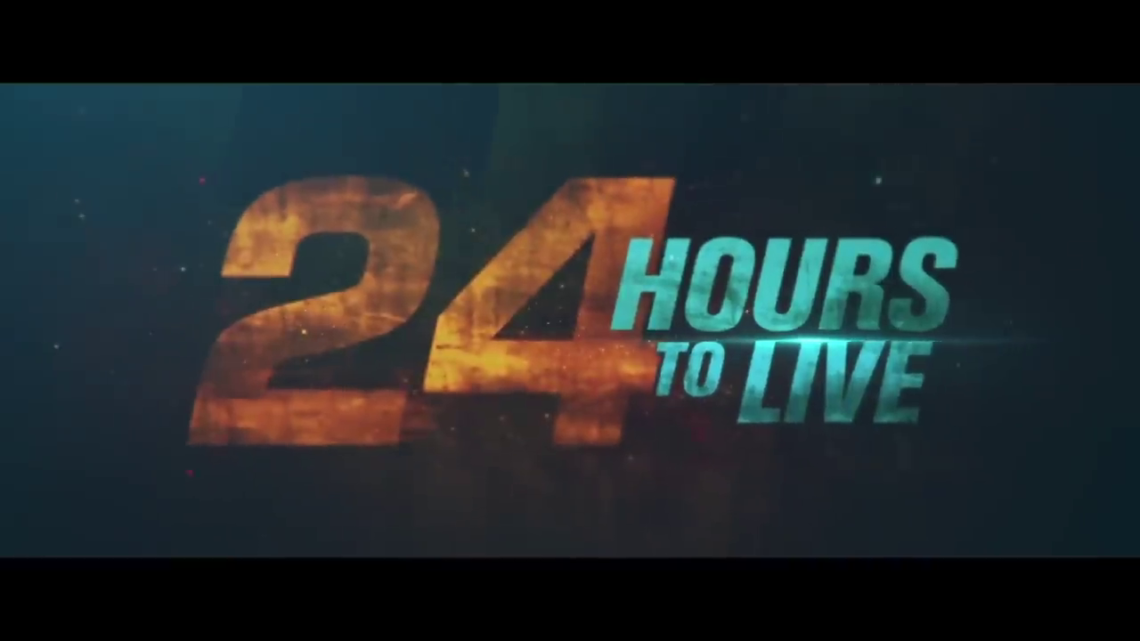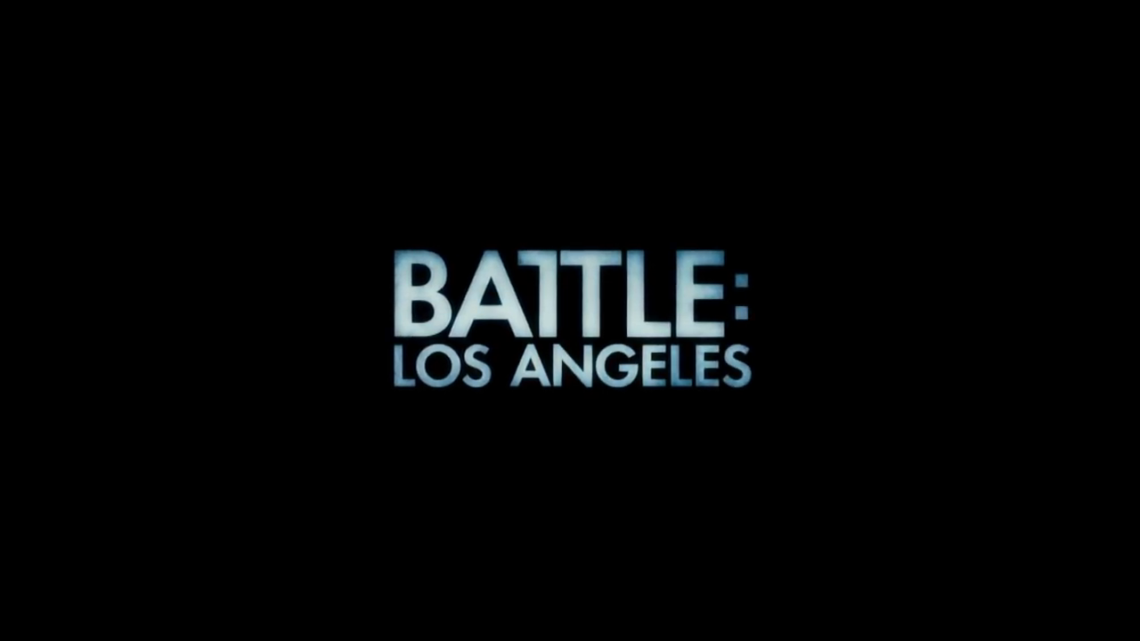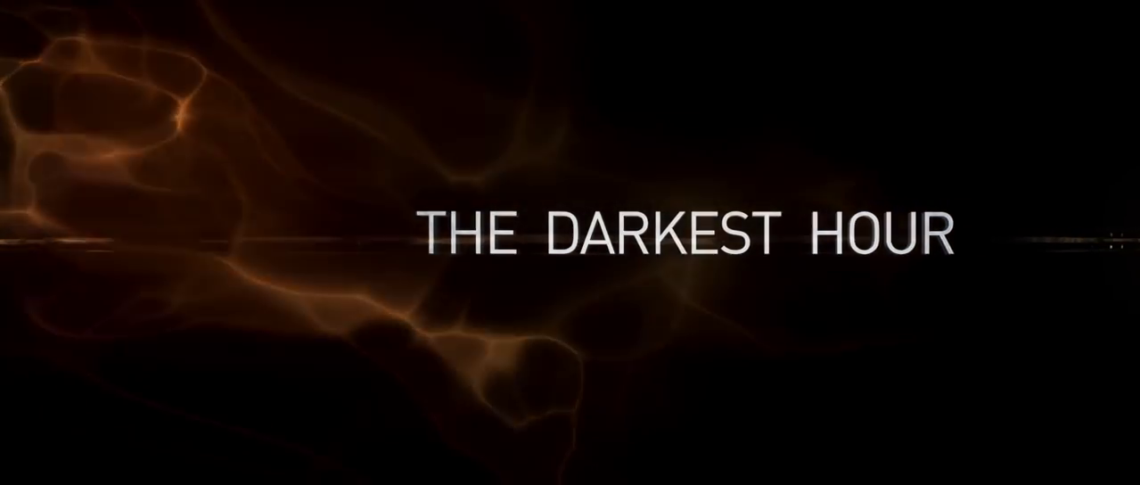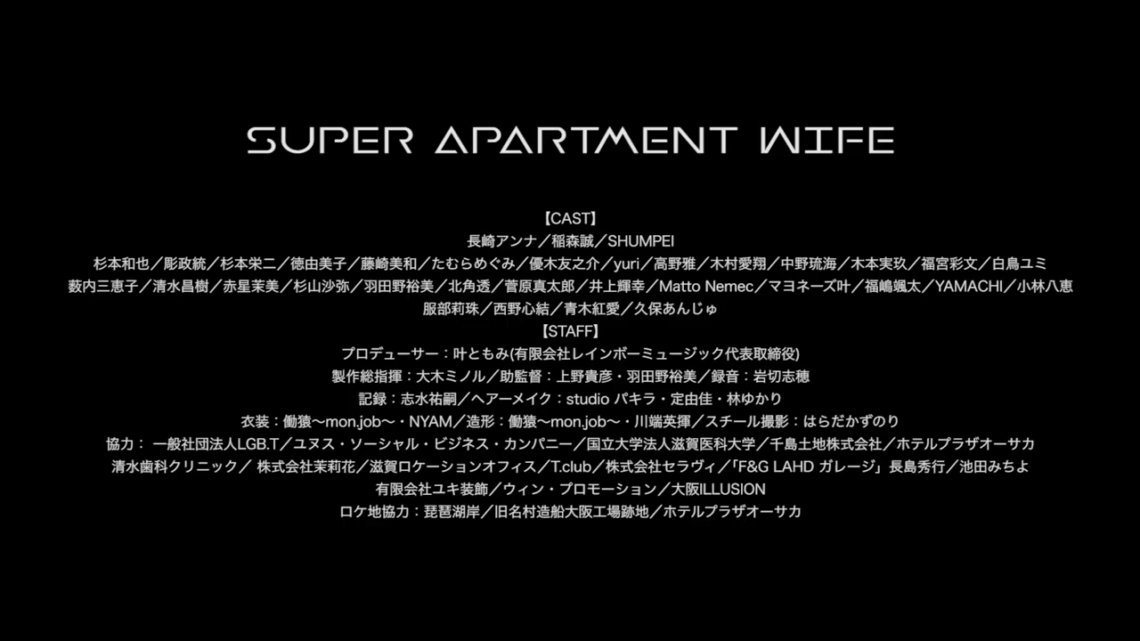-
#612 – 24 Hours to Live (2017)
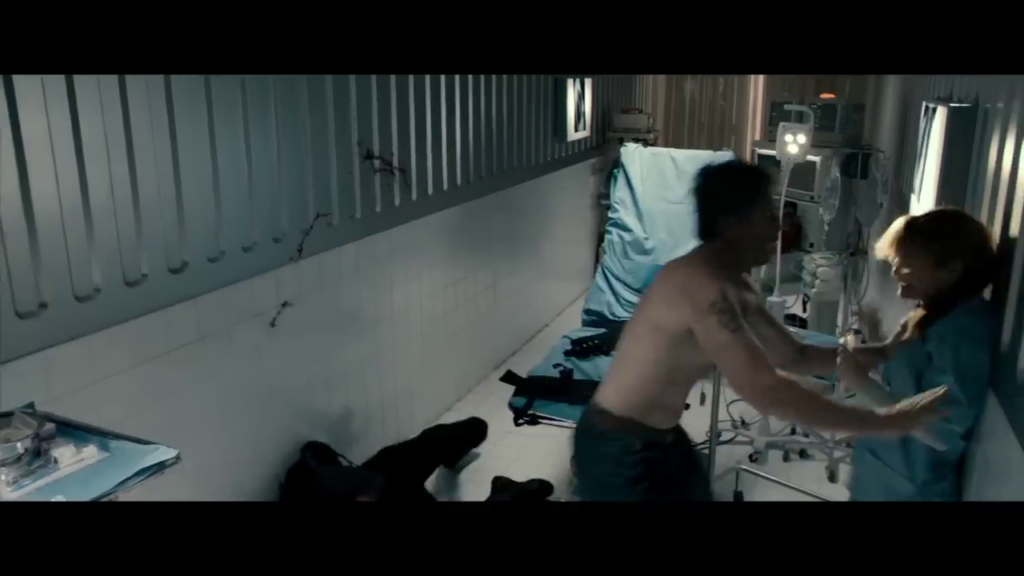
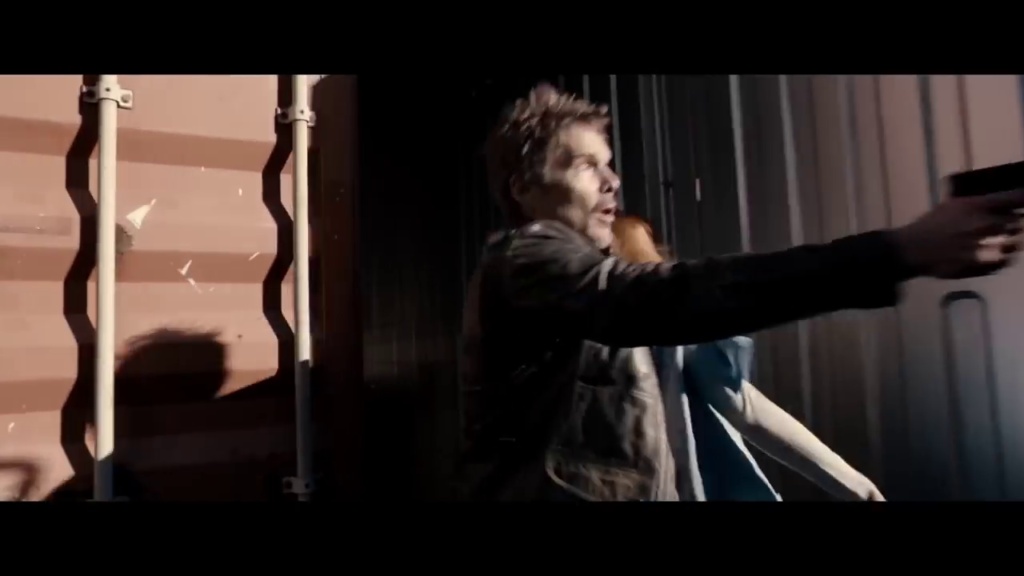
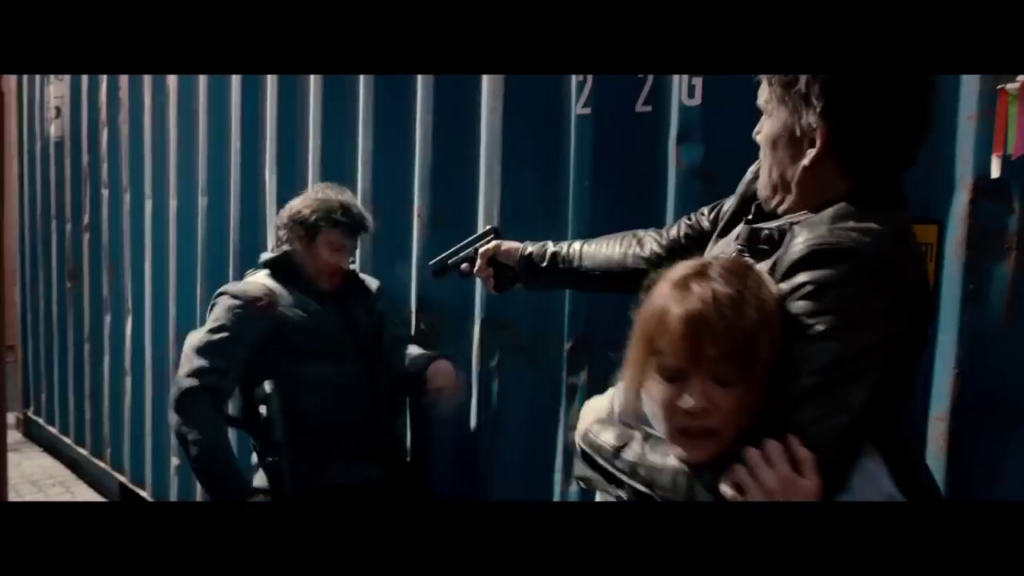
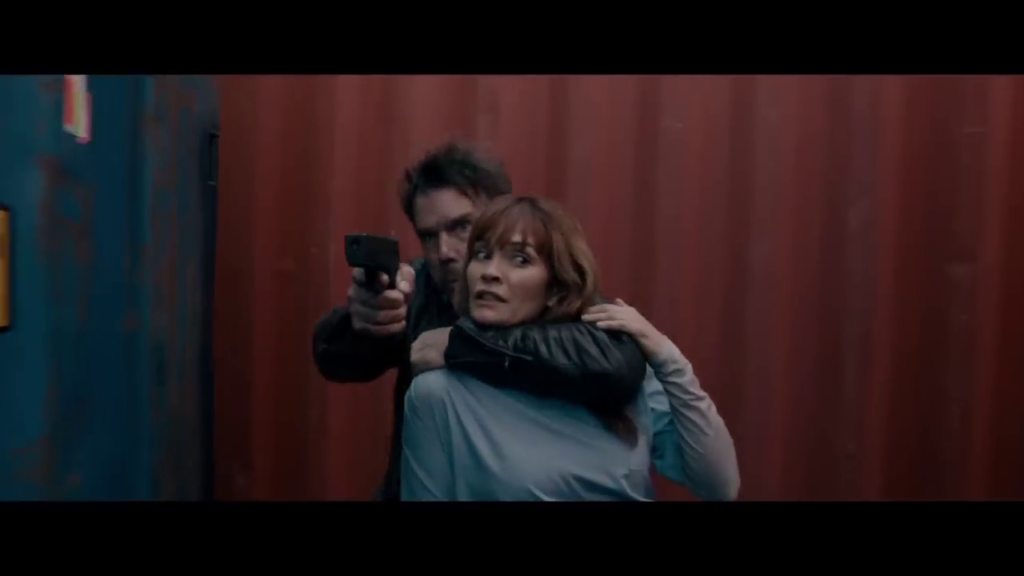
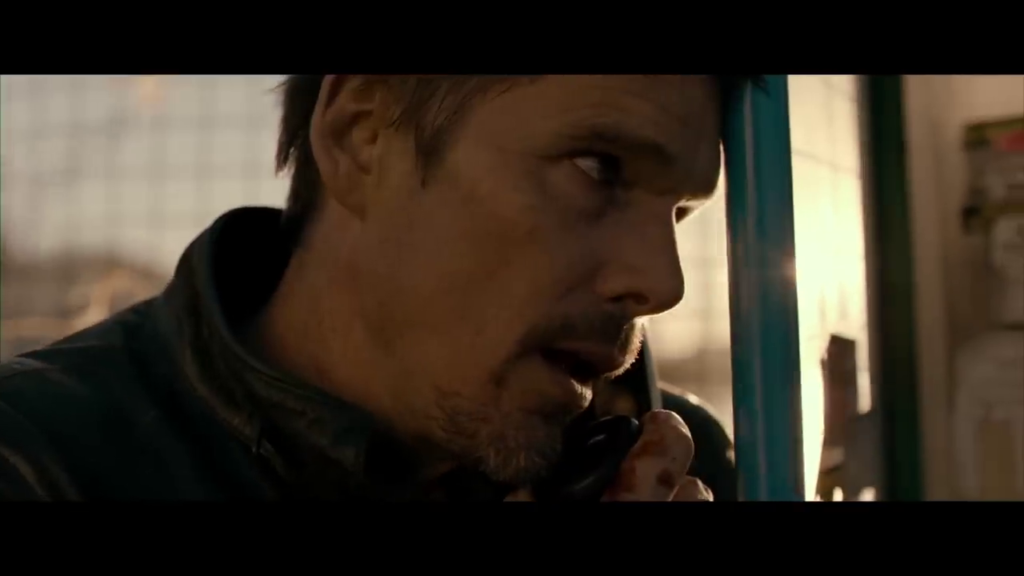
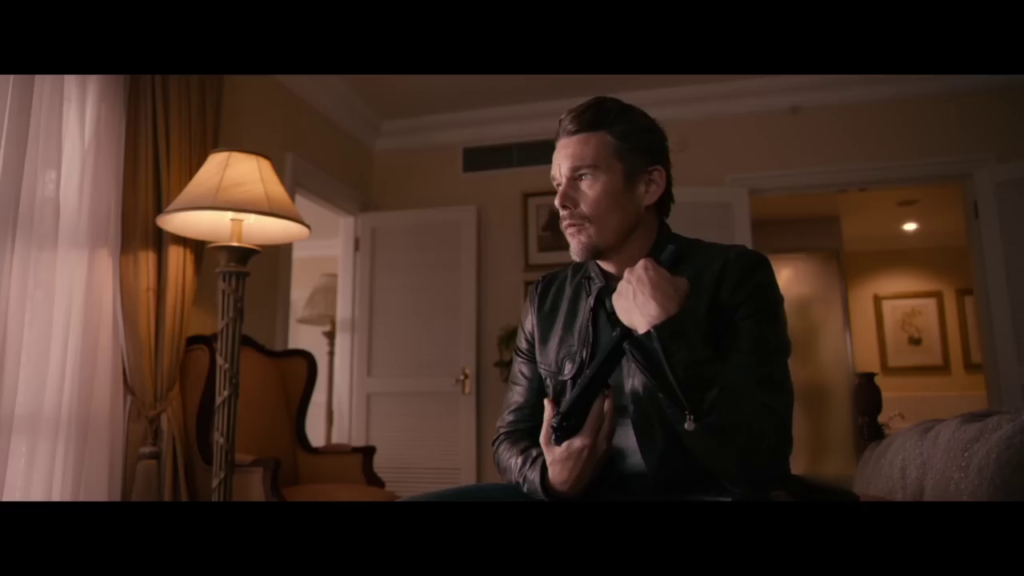
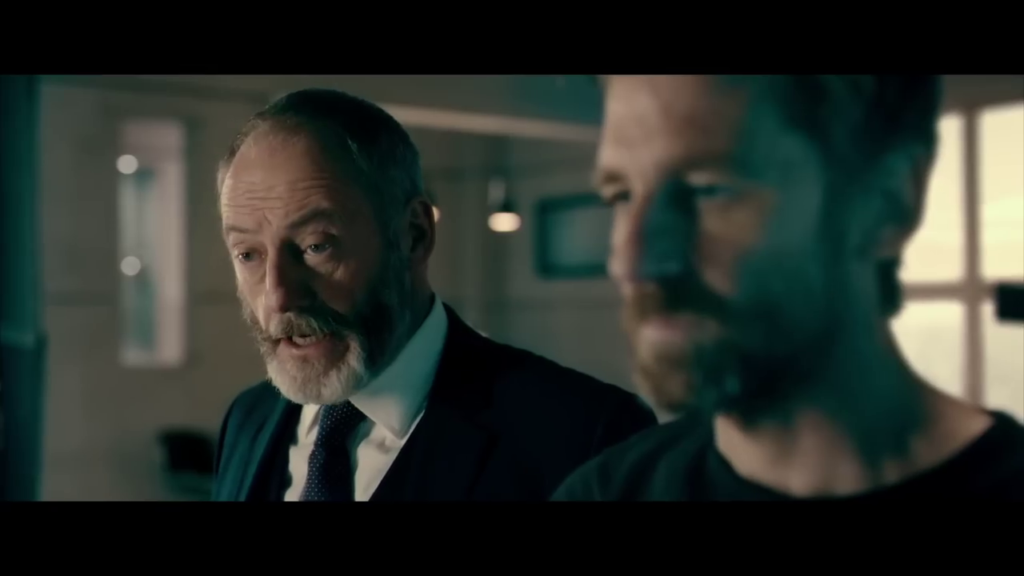
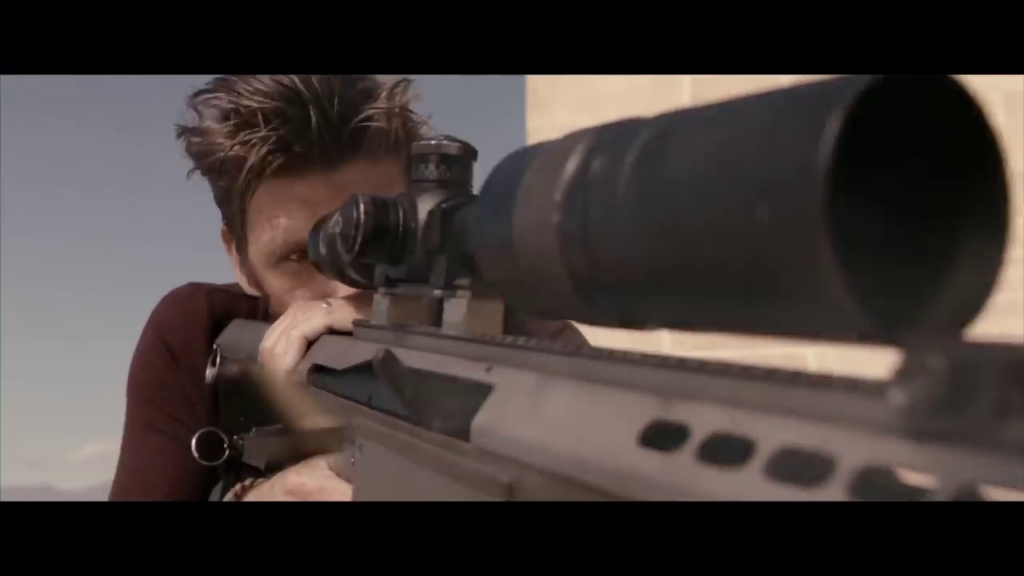
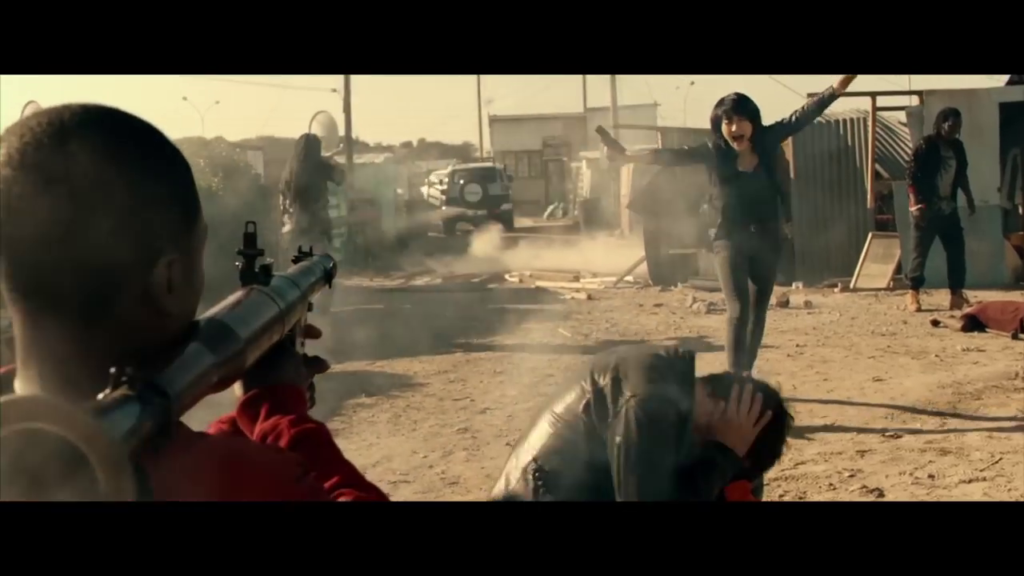
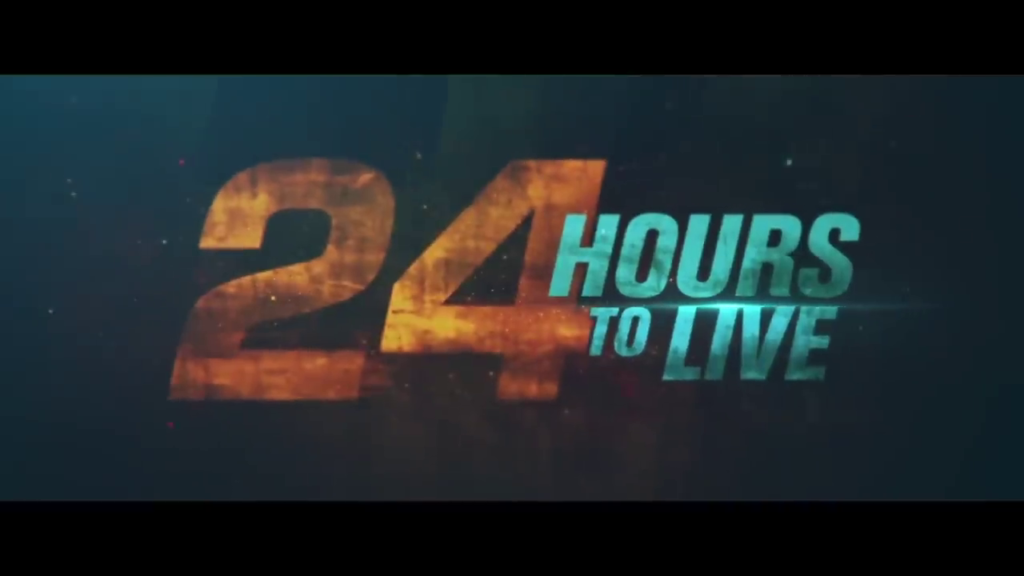
24 Hours to Live (2017)
Film review #612
Director: Brian Smrz
SYNOPSIS: Travis, an Assassin working for a powerful agency is killed while on the job, but is brought back to life with an experimental drug to get information that died with him. Attempting to kill him when this is done, Travis escapes and teams up with Lin, the Interpol agent who killed him, to get revenge on his former employers…
THOUGHTS/ANALYSIS: 24 hours to Live is a 2017 science-fiction action film. Travis is an assassin who is roped into a job to take out an informant before he delivers evidence that will bring down the agency he works for. When he is killed by the Interpol agent protecting the informant, the agency resurrects him with an experimental procedure to get the information for him, but try to kill him again when he gives it them. On the run from the agency that hired him, he engages on a mission of revenge, by teaming up with the Interpol agent that killed him. Made by the producers of John Wick, the film clearly makes use of their previous experience on that film, as it is primarily an action-fest, full of shooting, running, fighting, and the sort. It does differ from John Wick though, as there is actually space in between action scenes, and there’s more of a static camera in place of the close-up, shaky shots that immerse you in the action and never let you go. As such, the film falls into very standard action film territory, with not much to distinguish it. The film does have a story, but as always with action films, it is not the most important aspect of the film. It serves its purpose for the most part, but there’s some elements that don’t really need to be there. There’s sometimes a bit too much padding between the action scenes with bits of story, but on the whole it’s not too distracting.
Ethan Hawke in the lead brings enough grit and energy to the role to keep the film entertaining, backed by a familiar backstory of having his family killed, you’ll recognise all the twists and turns the film throws at you. The setting of South Africa provides something a little bit different, but not too much. Overall, 24 Hours to Live is a one-time watch that has enough action and entertainment to see you through to the end. Relying on typical story points that won’t leave much of an impact, there’s still plenty of energy in the action that will distract you throughout the runtime.
-
#611 – Them (2021)
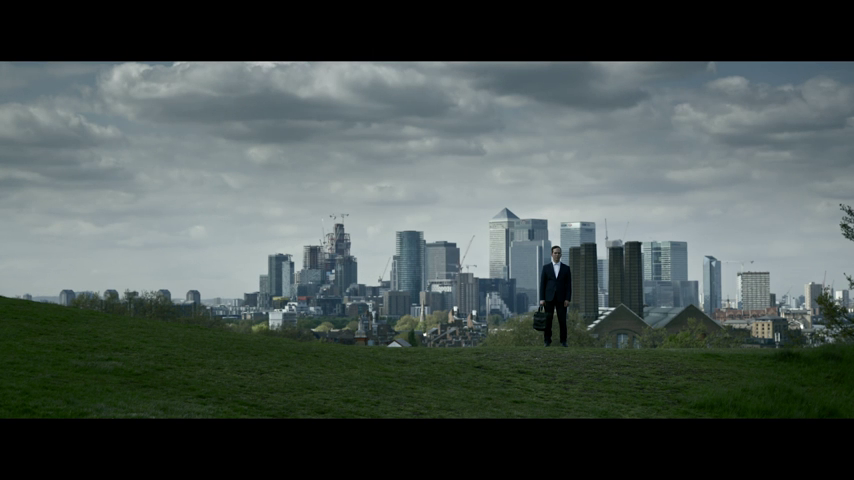
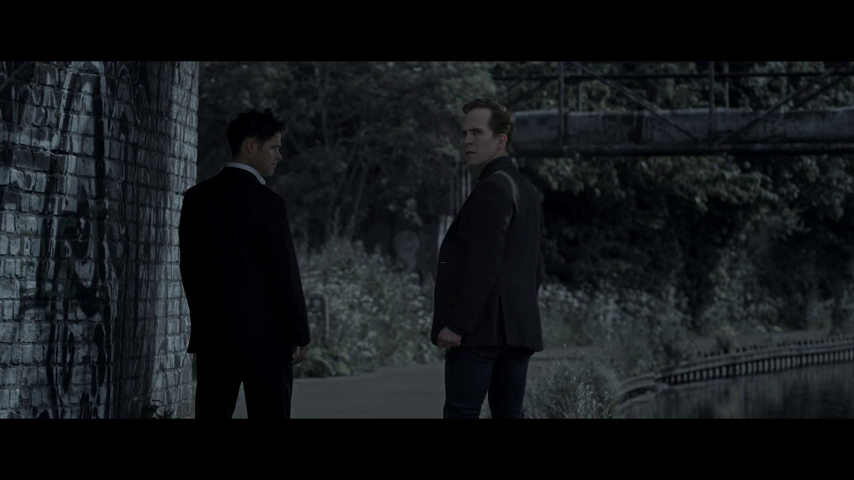
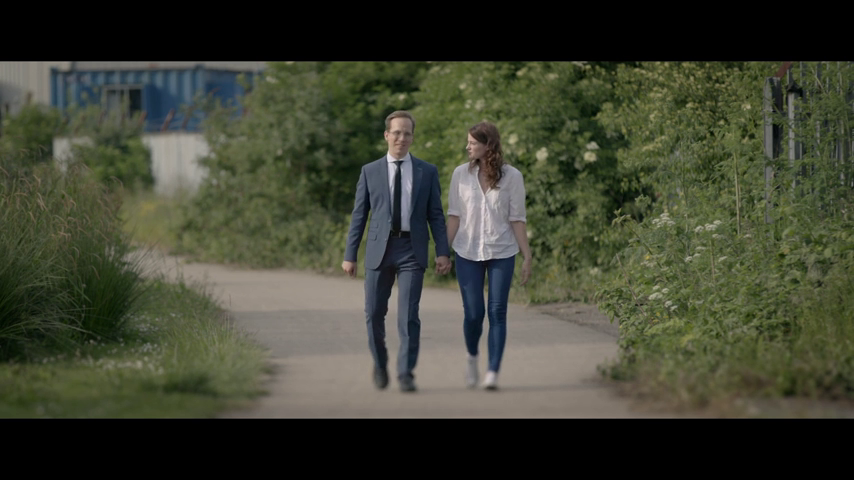
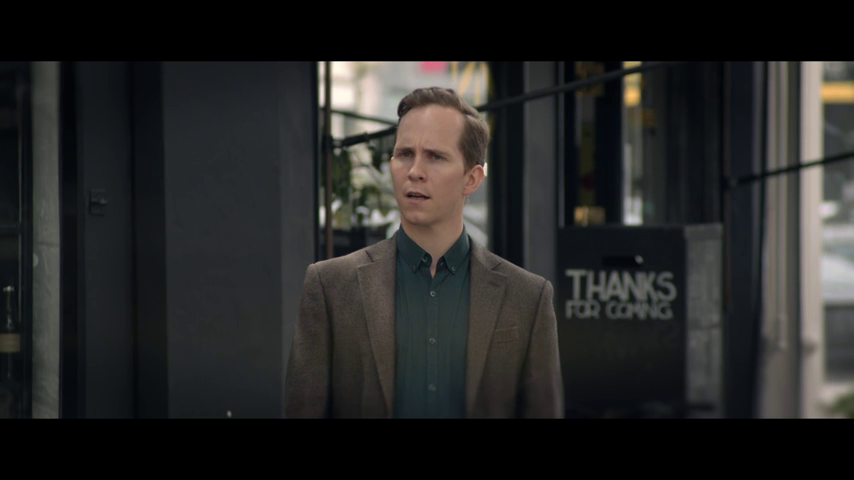
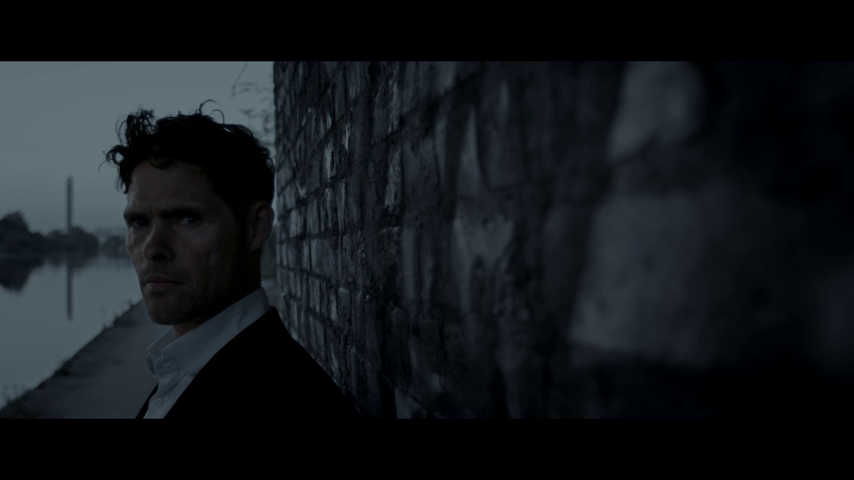
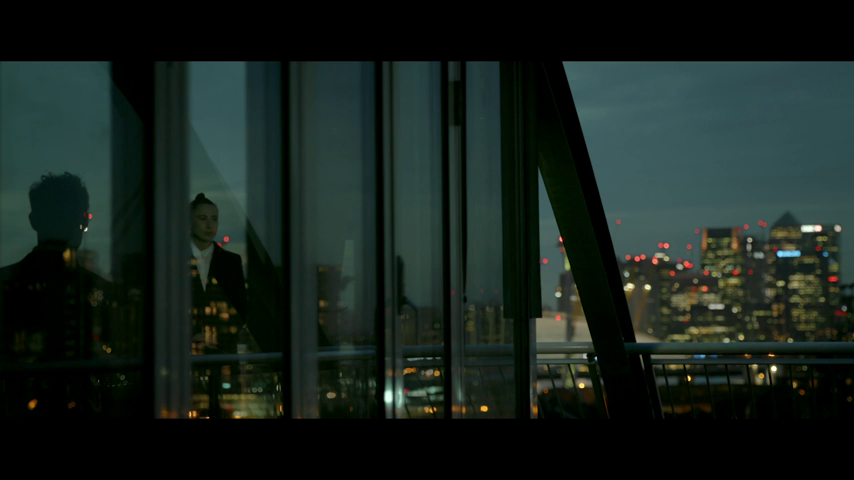

Them (2021)
Film review #611
Director: Ignacio Maiso
SYNOPSIS: Humans live the same moments in their lives over and over again. A few manage to break free of the loop and become “them” who watch over the humans. Daniel becomes one of them, and wants to wake up his wife too, but problems arise when he tries to do so…
THOUGHTS/ANALYSIS: Them is a 2021 film. Every so often you come across a film that is so devoid of any redeemable qualities you struggle to even call it a film. This is one of them. The story seems to be about how humans live in a state of repeating the same events in their lives. Sometimes, humans “wake up” and become “them,” who watch over the humans. There’s…not really much else to the film. The fundamental problem with this film is that absolutely explained or explored. Obviously, it’s okay if film’s leave things open for interpretation, but there has to be some worldbuilding, rationale, rules…anything by which events unfold. here we get absolutely nothing. If the writers had any kind of vision or reason behind what is going on, it in no way translates to the screen. I felt like maybe there was an attempt at being a mix of Wings of Desire and The Matrix, but there’s so little to go on that it no way reaches that kind of level where you can leave things open to interpretation, because there’s nothing built up to interpret.
The main core of the story I suppose is centred around Daniel, who “wakes up” from his human existence. He wants to also wake up his wife, but this is considered dangerous, also the fact that it’s maybe not his wife at all, just a repeated dream that different people live through, including him. Again, it’s very complicated, and the shift between it being personal and impersonal doesn’t really create conflict, it just muddies an already incoherent story. Given that this is a human story at its core, the acting is anything but: nearly every scene is just dialogue of people standing around talking, but the performances are so inhuman. I don’t think this is just because of bad acting, but it seems to be directed this way? Every single character; human, them, or otherwise, engages in dialogue by leaving a three-second pause between responding, and I simply cannot fathom what for. Maybe you could argue that ‘them’ would speak this way since they are not human, but the human character’s themselves do it too, and makes them seem just a bit weird. There’s a character who wants to bring down the whole ‘them’ organisation and tries to recruit Daniel, but again, we never see anything they do, what their aims are, or how they want to go about it: it’s all just dialogue that is eventually just talked away. The supervisor of ‘them’ also gives nothing away, and just asks for reports from his assistant, which are likewise devoid of significance.
I suppose if you want to defend the decisions of this film, it was made during the Covid-19 pandemic, so you can imagine there’s no crowds or big gatherings, but surely there could have been more than just every scene being just two people talking with awkward pauses between every line of dialogue. The film on the whole is simply a bewildering void of any kind of cinematic content, that is unable to establish any kind of characters or worldbuilding. Again, it feels like someone watched Wings of Desire, blended it with The Matrix, and barely understanding what either of them were about, threw together some rough ideas that go nowhere, and with the depth of a piece of paper. Redundant viewing that is simply a waste of time.
-
#610 – Battle: Los Angeles (2011)

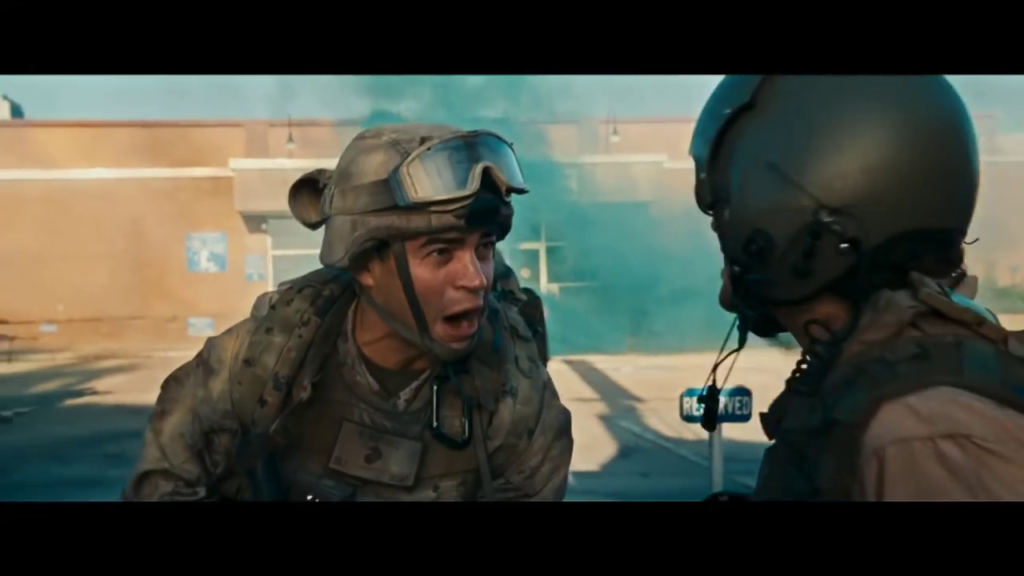

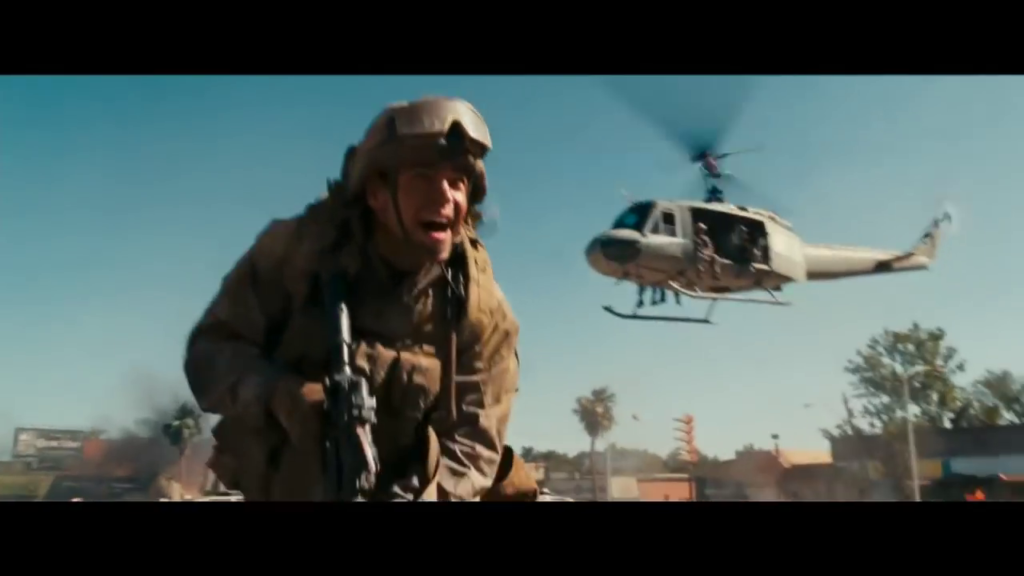
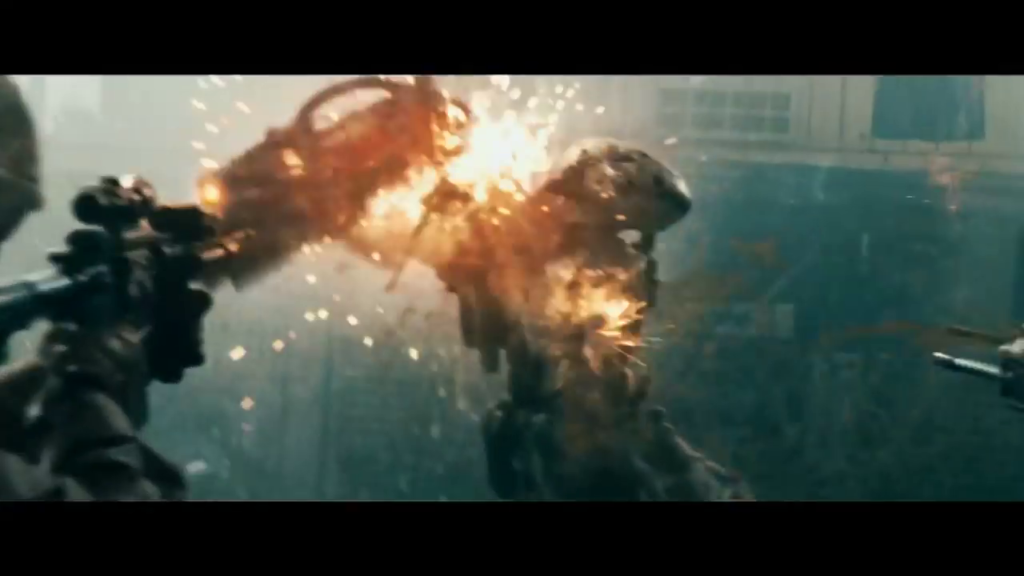
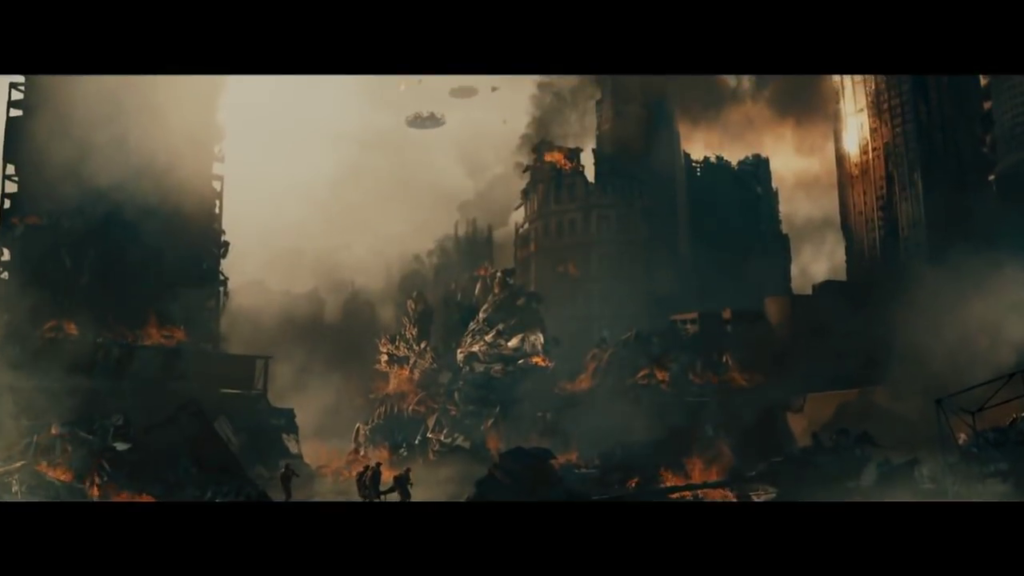
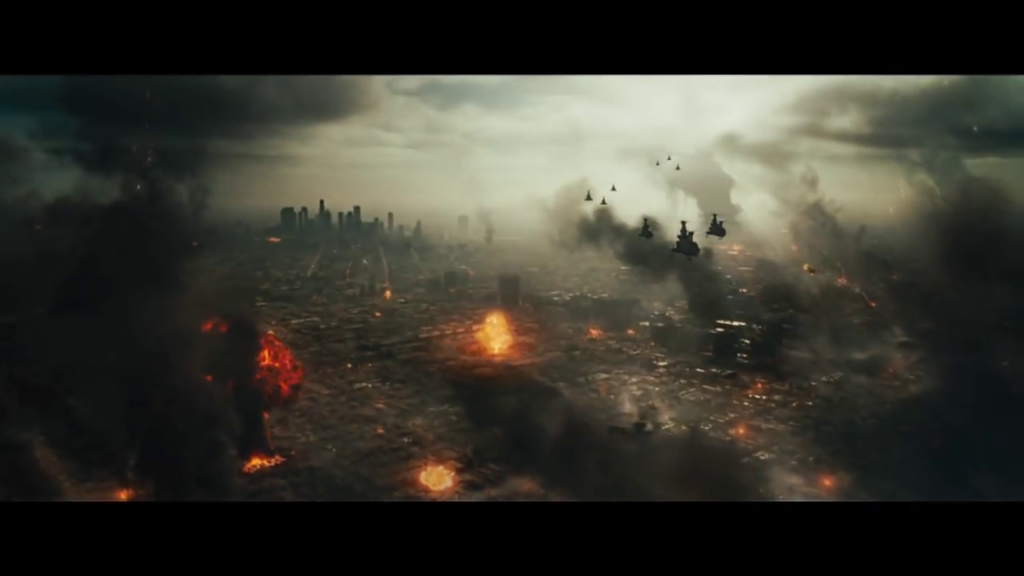

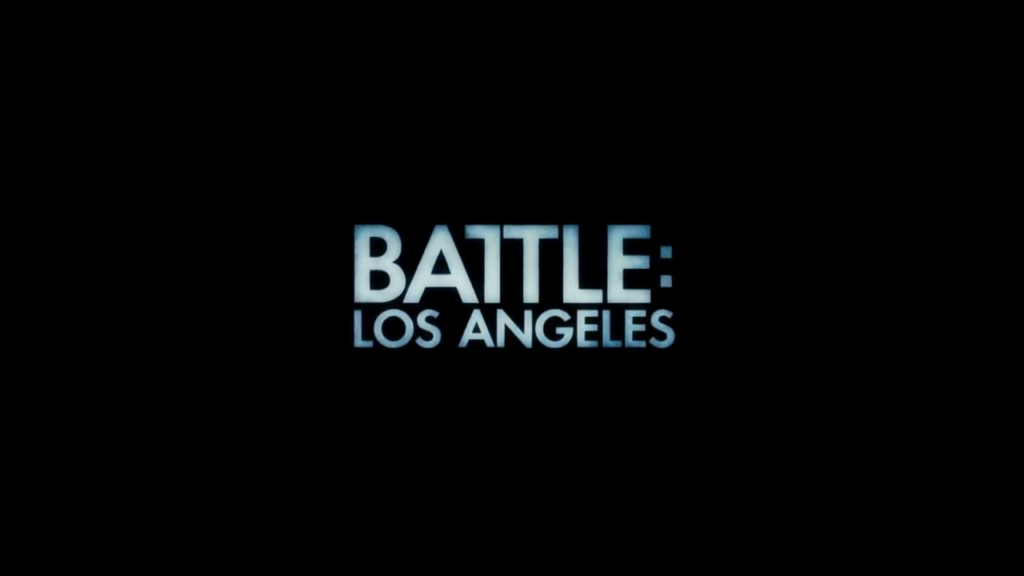
Battle: Los Angeles (2011)
Film review #610
Director: Jonathan Liebesman
SYNOPSIS: Strange meteors begin falling from space and landing in the ocean around major coastal cities. It turns out that are not meteors at all, but aliens intent on the invasion of Earth. A marine unit is assigned to the evacuation of civilians, and finds itself heading onto the frontlines in an attempt to bring some civilians home before the area is bombed…
THOUGHTS/ANALYSIS: Battle: Los Angeles is a 2011 sci-fi military alien invasion film. Starring Aaron Eckhart as Staff Sargent Michael Nantz, he is forced into a unit before his retirement to help evacuate civilians in Los Angeles, as it turns out a meteor shower that has dropped meteors off the shore of coastal cities around the world is actually the start of an alien invasion. Focusing on Nantz and the military platoon he is assigned to, the film feels like Black Hawk Down with an alien invasion plot, with the aim of creating that sense of the viewer being on the ground amidst the thick of the action. It does this with the low camera angles and close ups that put you on the same level and right beside the characters, to generate that kind of adrenaline and urgency that the situation demands. At first, it definitely feels disorienting as the camera shakes about and you can’t get an establishing shot to position yourself, but you do get somewhat used to it. Also, the film does seem to pull back from this technique in the bigger action scenes to use more typical shots and compositions, whether that’s because of the bigger scale of the aliens, or the lack of expertise to pull off the more advanced scenes is difficult to say. Regardless, the overall story is very much a typical alien invasion story in the typical Los Angeles setting, which hampers the film’s ability to offer too many surprises.
At the beginning of the film, we are briefly introduced to the marines that make up the squad, their families etc., but it’s all done very quickly, and we don’t get much of a sense of distinguishing many of the characters. However, it’s not too important to know their backstories when they’re in the heat of combat, it’s just that it would be nice to be able to distinguish them a little to stop those scenes becoming very cluttered. Aaron Eckhart is a commanding and likable lead, with the typical baggage his character as a combat veteran has. The rest of the characters, as mentioned, are briefly introduced at the start, or throughout, so we have a basic idea of who they are, but their backgrounds don’t matter too much once you get into the combat. The film also keeps you guessing which characters are going to make it, although the death’s of some of them are fairly obvious. The aliens themselves we don’t see too much of, but they are weird and ‘alien’ enough to offer something a little different. Their background and motivations aren’t explored too much, but again, that’s part of the film being from the soldier’s perspectives, where you don’t need to worry about anything other than killing your enemy.
We get the usual big scenes of destruction that you would expect, but there’s nothing much to distinguish it from all the over alien invasion films that are set in an American city. The film was actually shot in Louisiana with sets of Los Angeles reconstructed on location, so we obviously don’t see too much of the city or it’s landmarks. Overall, Battle: Los Angeles is a fairly entertaining one-time watch, but doesn’t really distinguish itself from other alien invasion films set in a major U.S. city. The perspective from the military unit is jarring at first, but soon finds its rhythm. It’s got enough to make it a complete experience, but there’s not really much that will stay with you.
-
#609 – Darkest Hour (2009)
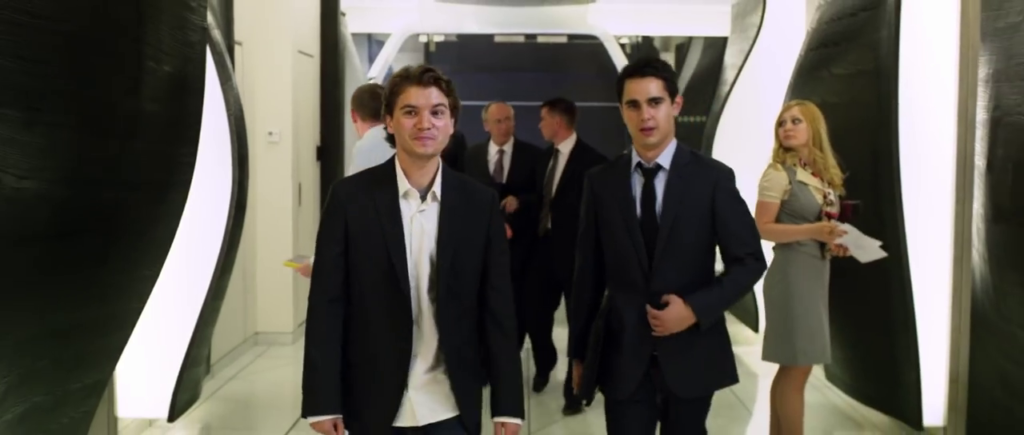
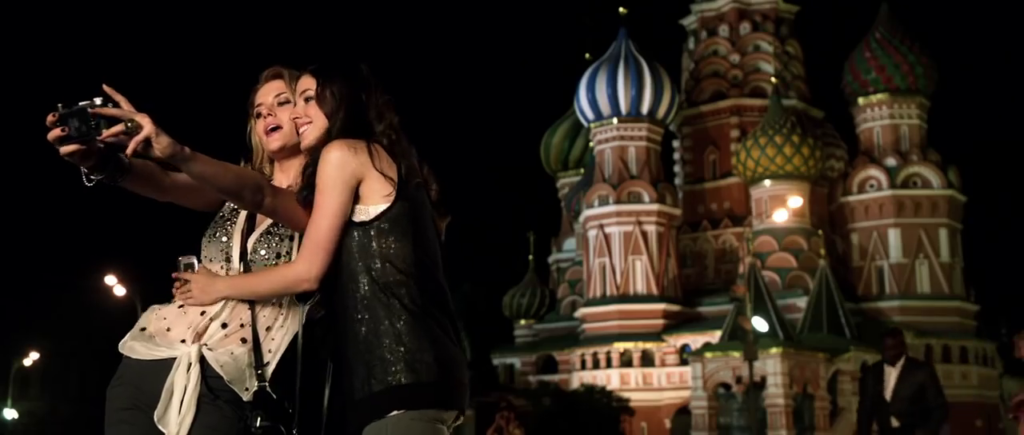
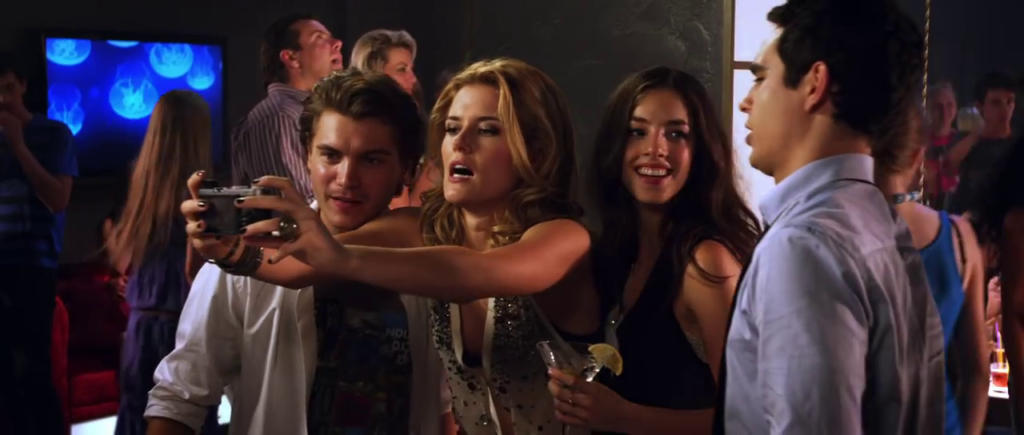
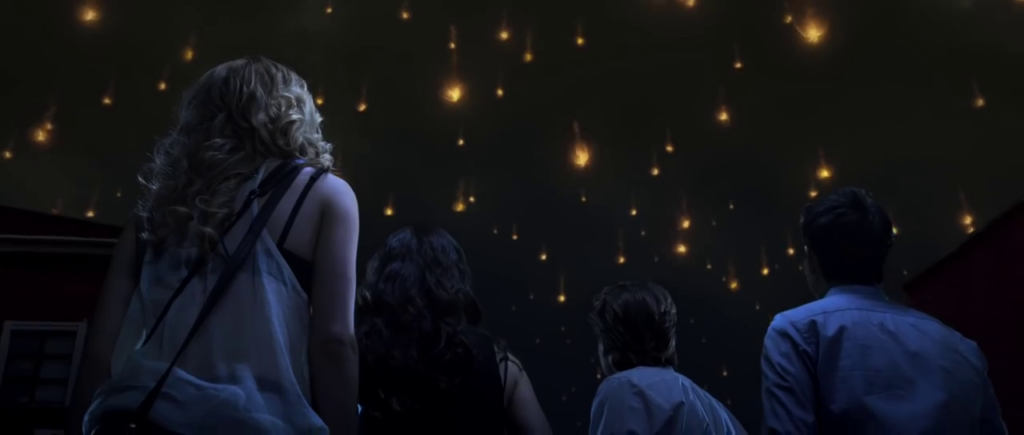


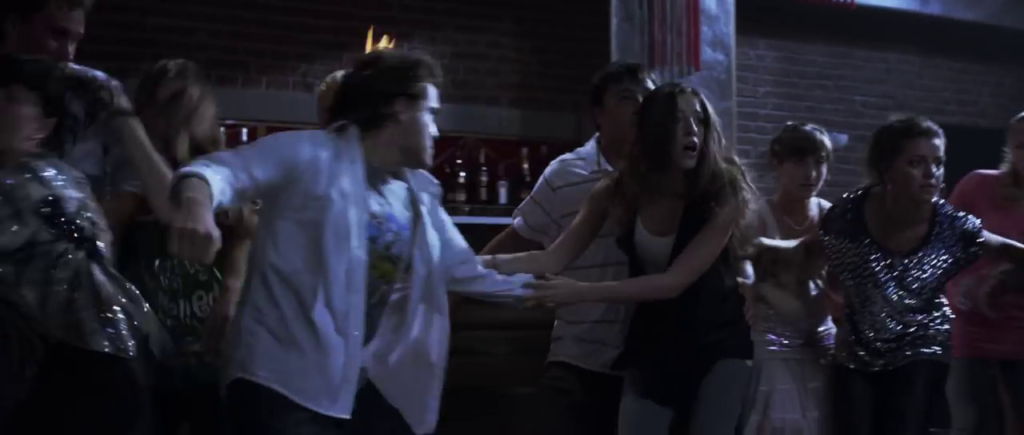
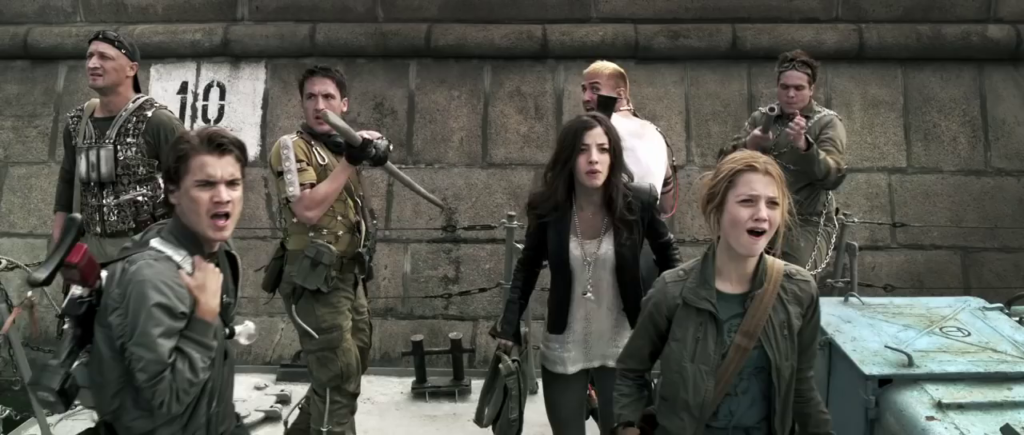
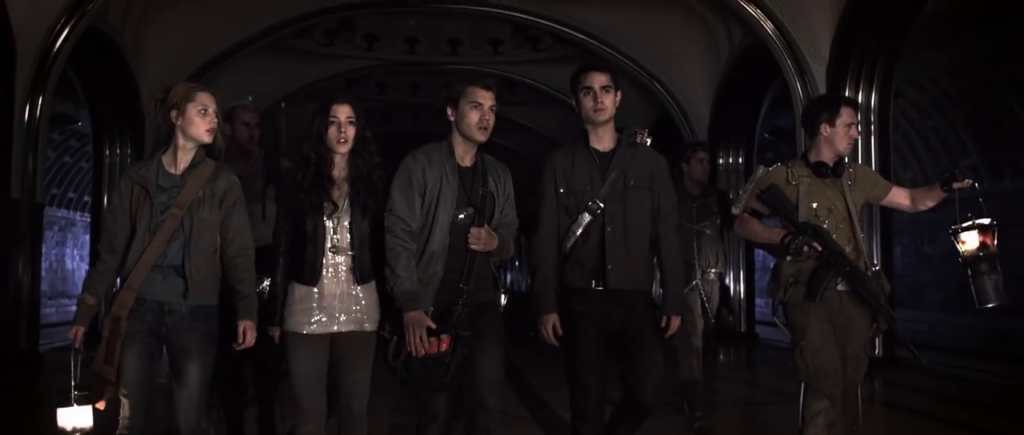

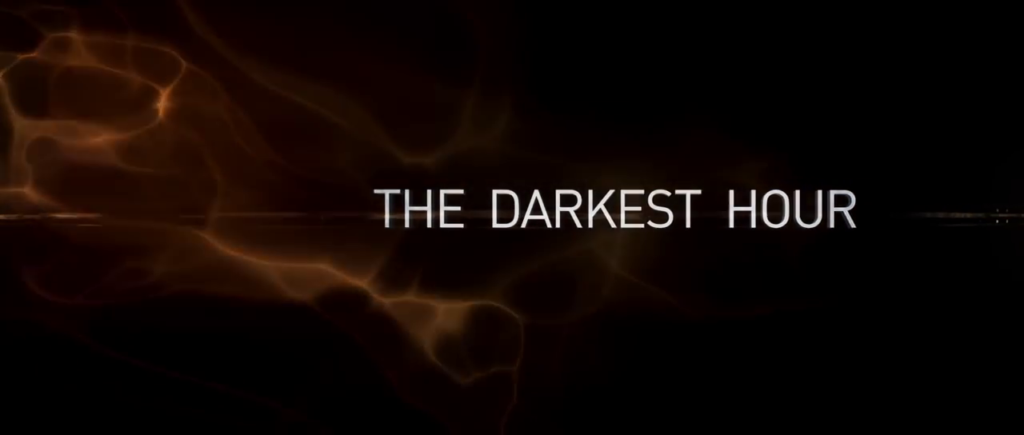
The Darkest Hour (2011)
Film review #609
Director: Chris Gorak
SYNOPSIS: Two American entrepreneurs travel to Moscow for a business deal. When they find that their business partner has sold them out, they go to a bar to drown their sorrows, meeting two other American tourists there as well. While there, an alien invasion gets underway and everyone flees as the aliens hunt them down. Managing to hide underground for a few days, the survivors emerge and try to make their way through Moscow, all the while avoiding the aliens that are roaming the city…
THOUGHTS/ANALYSIS: The Darkest Hour is a 2011 sci-fi alien invasion film. In the opening, we see two American entrepreneurs, Sean and Ben, travelling to Moscow for a business deal. When they arrive, they find their business partner, Skyler, has already sold them out and cut them out of the deal. Going to a bar, they meet two American women who are visiting Moscow on holiday. Their party is cut short though, when an alien invasion gets underway, and they begin disintegrating humans. The four Americans, along with Skyler (who just happens to be at the bar too), manage to hide underground, and after a few days, emerge to try and get to the American embassy. To do so, they must navigate the deserted streets of Moscow…well, deserted apart from the invisible aliens prowling the streets anyway…
The film is very much a typical alien invasion/survival film, with a group of ‘ordinary’ people just trying to survive the post-invasion world. The only real unique thing about the film is that it’s set in Moscow, rather than a more typical U.S. setting, but this doesn’t really offer anything interesting for the plot. We get plenty of shots of an abandoned Moscow, but none of the film’s action scenes take place there, which is a missed opportunity. As the group moves through the city, they meet other people and learn a bit more about the invasion, doing all the typical beats and plot points you would expect. The film does keep you on your toes with who is going to live or die as well, always leaving itself open to a sharp turn.
The characters are perhaps the big thing that really drag this film down. From the start, the characters come across as unlikable. Sean and Ben are laddish techbros whose banter is insufferable. Natalie and Anna, the two female leads, aren’t much better. Their turn-around into survivors is a bit of a leap and they almost feel like completely different people. Ben particularly is someone who does not seem like the heroic leader he becomes at the start. The supporting cast fulfil their roles, but that’s about it. There’s no real attempt to develop the character’s personalities, back stories etc. and it is unbelievably dull watching them wander around aimlessly. On top of all this, the acting is so flat and bland that means it is impossible to feel anything but disdain towards these characters.
The aliens themselves are invisible, which conveniently means we never get to see them, or other characters interact with them. The brief glimpses we do get of them show some very average looking CG lacking spectacle or detail. The motives of the aliens is also left very much unexplored, other than they are on Earth seemingly to strip it of minerals. This isn’t so much of a problem, because you don’t expect survivors to try and work out motivations when they’re trying to survive, but the film needed something for the viewer to get into. As it stands though, The Darkest Hour is a drab and bland venture that, despite the more unique setting, fails to grab viewers attention thanks to it’s one-dimensional characters, flat acting, and a general lack of anything interesting happening on screen.
-
#608 – Evolution (2001)
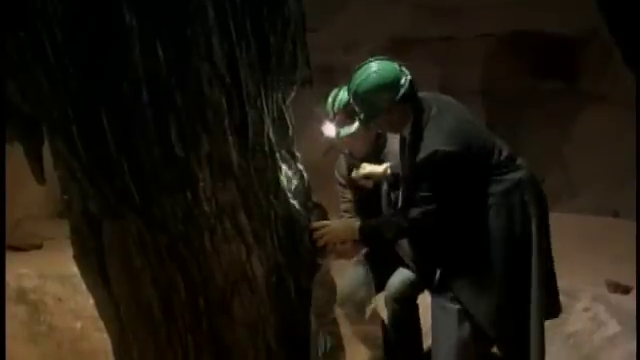
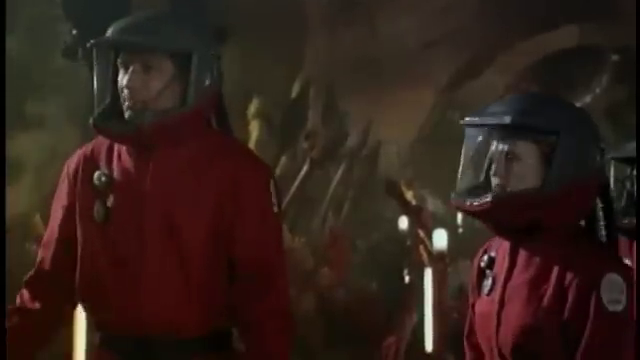
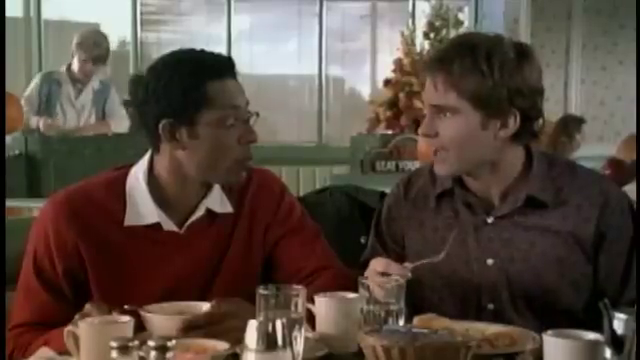
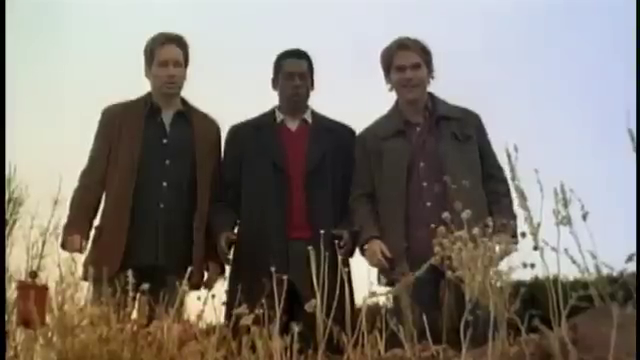
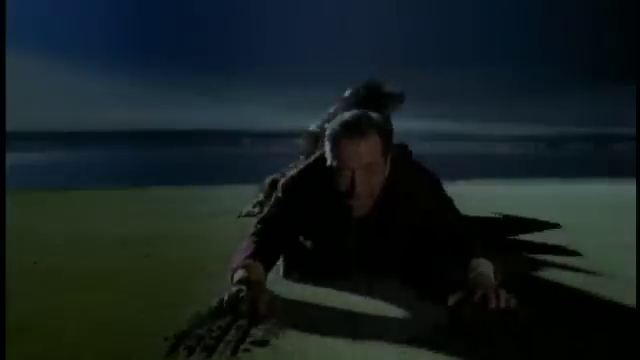
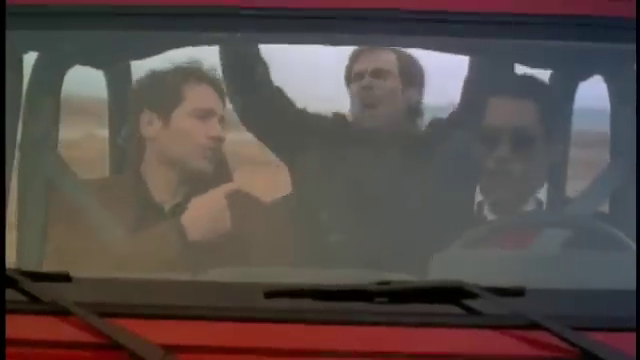
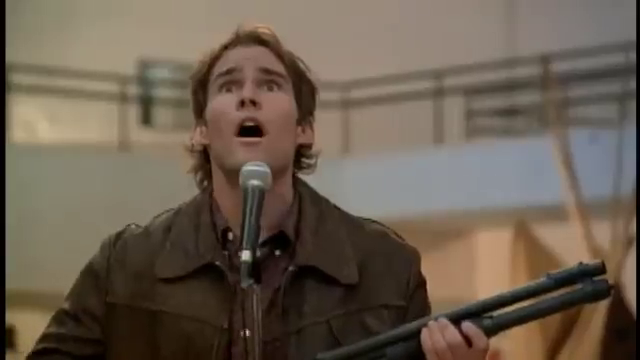
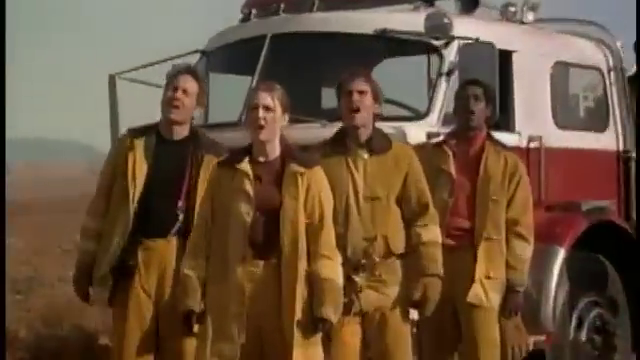
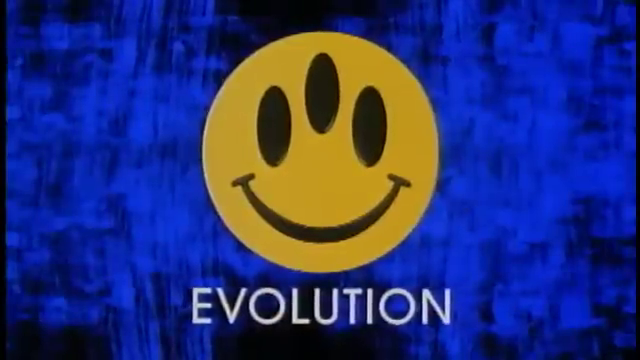
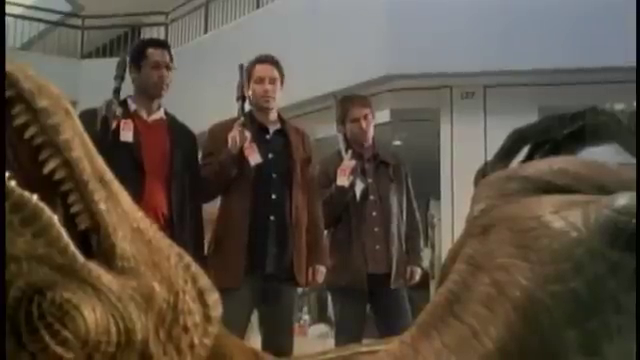
Evolution (2001)
Film review #608
Director: Ivan Reitman
SYNOPSIS: When a meteor falls from outer space into the Arizona desert, two local college professors make an amazing discovery: the meteor contains microscopic alien life. While the two think they’ll be rich and famous for their discovery, the microbes begin to evolve at an accelerated rate, and soon become full-sized creatures who threaten all like on Earth…
THOUGHTS/ANALYSIS: Evolution is a 2001 sci-fi film. The film opens with a meteor crashing into Earth somewhere in the Arizona desert, with signs of microscopic alien life. Two college professors make the discovery and keep it to themselves, thinking it will net them the Nobel prize and other such fame and riches. They learn upon examination that the microscopic life forms are evolving at an exponentially accelerated rate, and will quickly develop to be a threat to mankind. Teaming up with a trainee firefighter and a government scientist, they go about trying to stop the evolution before it is too late. One of the most notable things about this film is it obviously wants to be the new millennium’s Ghostbusters: from the director of Ghostbusters, who rewrote the originally more horror/thriller based script to turn it into a comedy, the main characters working at a college/university, and even Dan Akroyd having a minor role. I don’t think it’s up for debate that this ambition went largely unmet. The film isn’t totally terrible, but fails to achieve it’s objectives in a number of ways. The story is very predictable, and offers very little surprises, with the usual thing of the military taking over and cutting the main characters out of the loop, forcing them to save the world on their own. There’s also not enough battling with the creatures too, which somewhat makes sense given they are microscopic for a chunk of the film, but when they are combating the monsters, there’s nothing special or exciting about it, whereas in Ghostbusters had the super cool proton packs and gadgets. It might be unfair to keep comparing a film to another one, but in Evolution‘s case, I think it is completely fair to do so, considering that it clearly wants to be a new Ghostbusters.
While the leads David Duchovny and Orlando Jones turn in good performances (Duchovny wanting to take this role to move away from his role in the X-files by taking a film about aliens is a bit humourous), they don’t really have the chemistry to carry a lot of the scenes. Duchovny is obviously playing the Bill Murray/Peter Venkman role of the dry humoured personality, while comedian Orlando Jones does the more expressive stuff. This overlaps with Seann William Scott’s role as the trainee firefighter Wayne Grey a little, but he has a more youthful edge to appeal to a different demographic. Julianne Moore as Dr. Allison Reed is introduced as an attempted serious, but clumsy character, but that clumsiness never shows up again, which is odd. There’s some deleted scenes which show it again, but it’s odd that’s left in there at all. The biggest drag in the film is probably the crude humour. While it starts out building up different kinds of humour, it quickly devolves into crude and cheap jokes that offer nothing new. Again, while Ghostbusters blended in the adult humour perfectly with it’s supernatural theme, Evolution tries the same, but comes across a bit of a child’s attempt at adult humour. The film very rarely recovers it’s footing in this regard, and feels like it’s run out of humour fairly quickly.
The well known actors, as mentioned, do turn in good performances, but there’s often not much to work with in terms of story or unique things for them to do. The creatures are sometimes creative in their designs, but there’s not nearly enough variety in them, and neither do they look “alien” enough to stimulate the imagination. The climax is a bit boring too, with the cast attempting to stop a giant blob by spraying some anti-dandruff shampoo up one of it’s orifices. Overall, Evolution has some entertainment value to it, but it is always going to draw comparisons to Ghostbusters, which it can never meet, thanks to it’s humour constantly misfiring, and a plot that fails to evolve itself beyond it’s very typical cornerstones.
-
#607 – Sharktopus (2023)
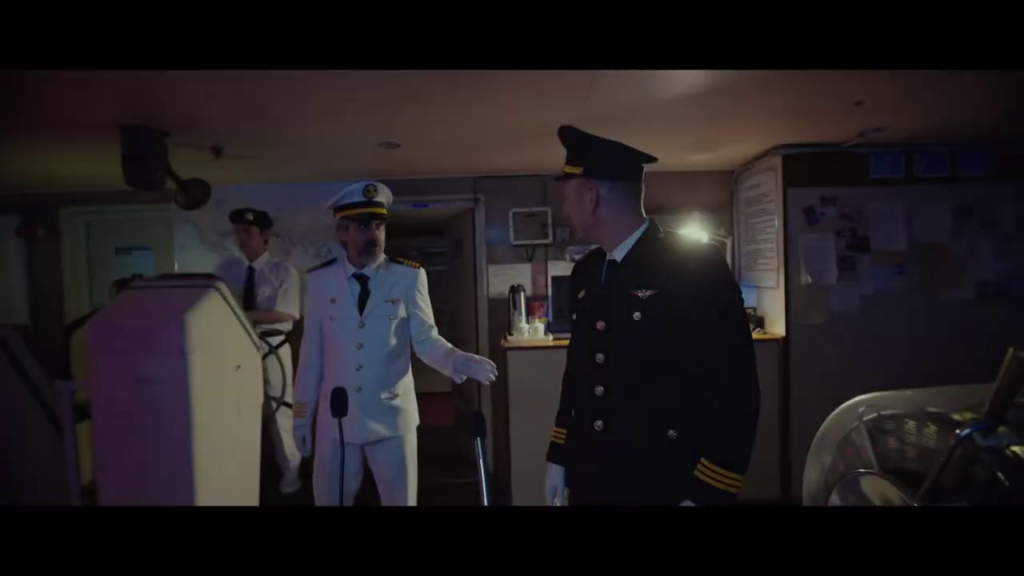
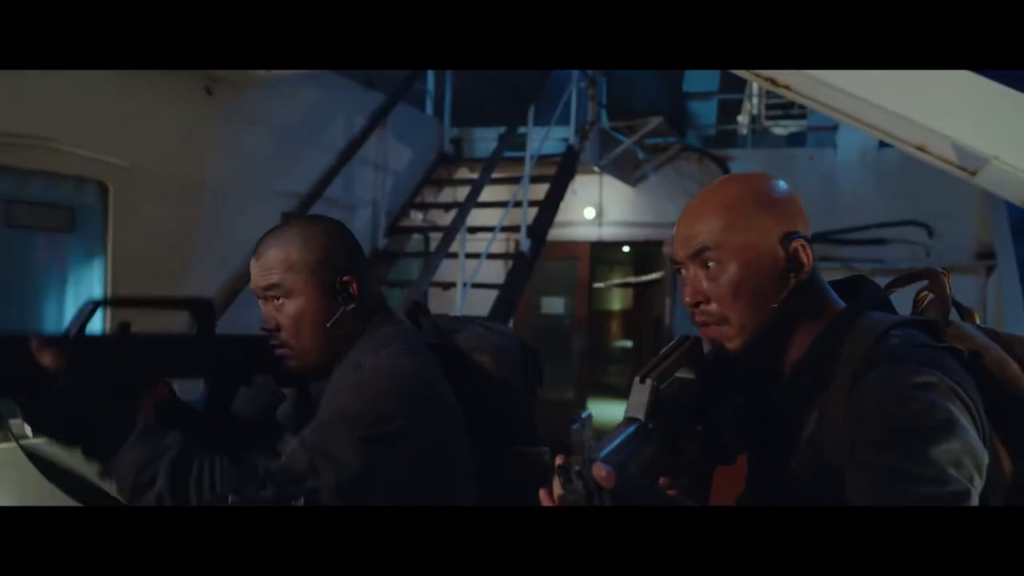
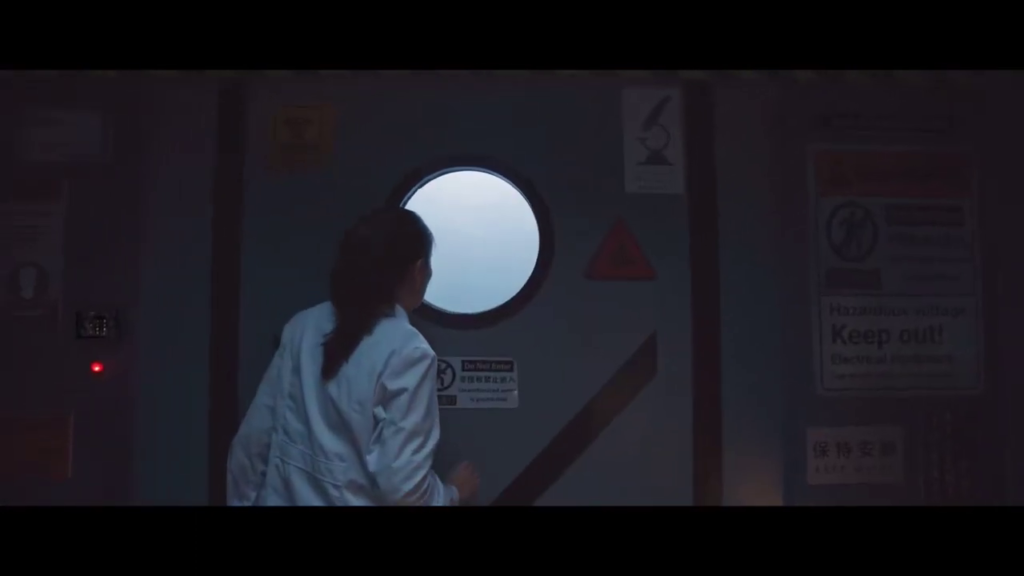
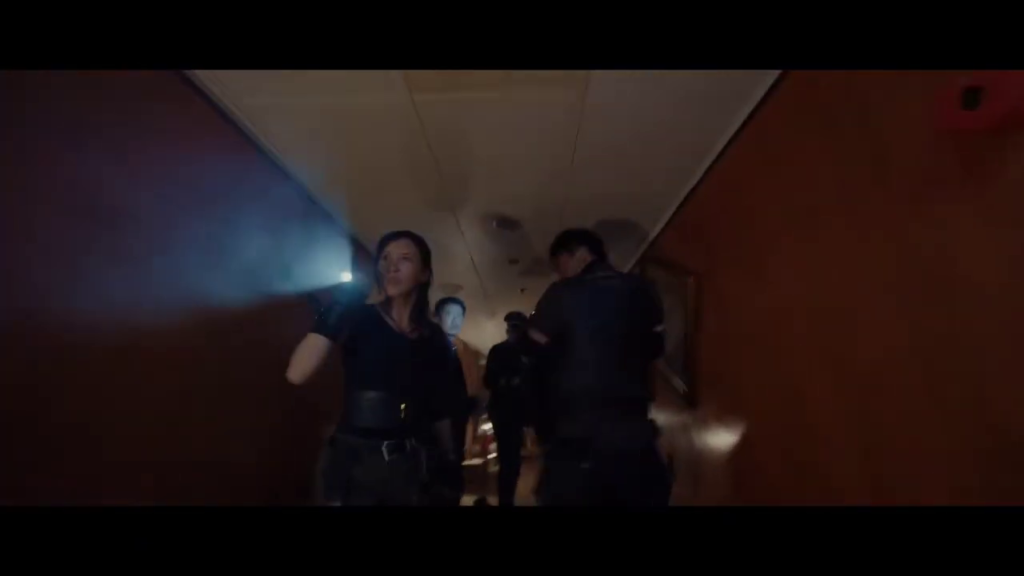
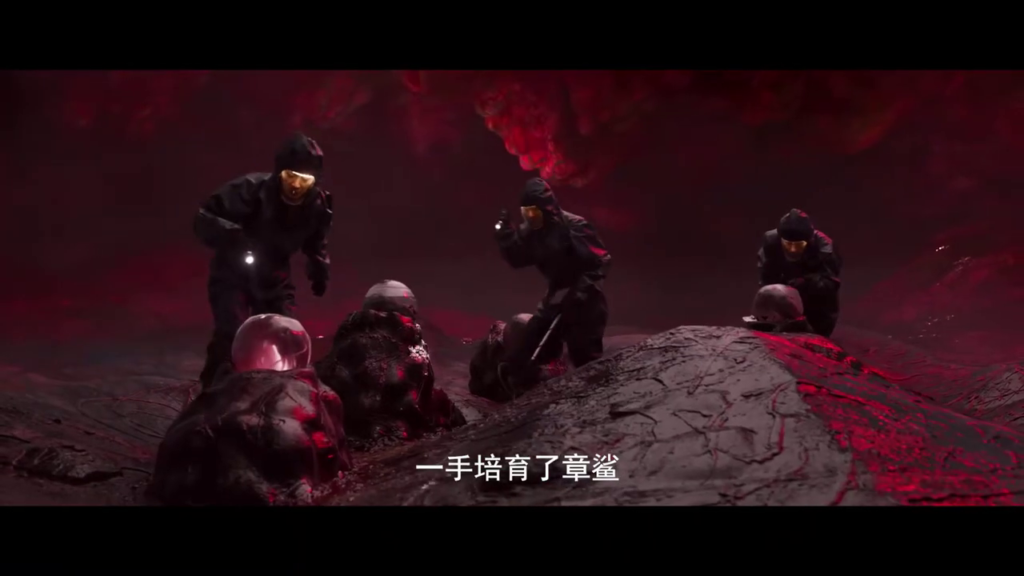
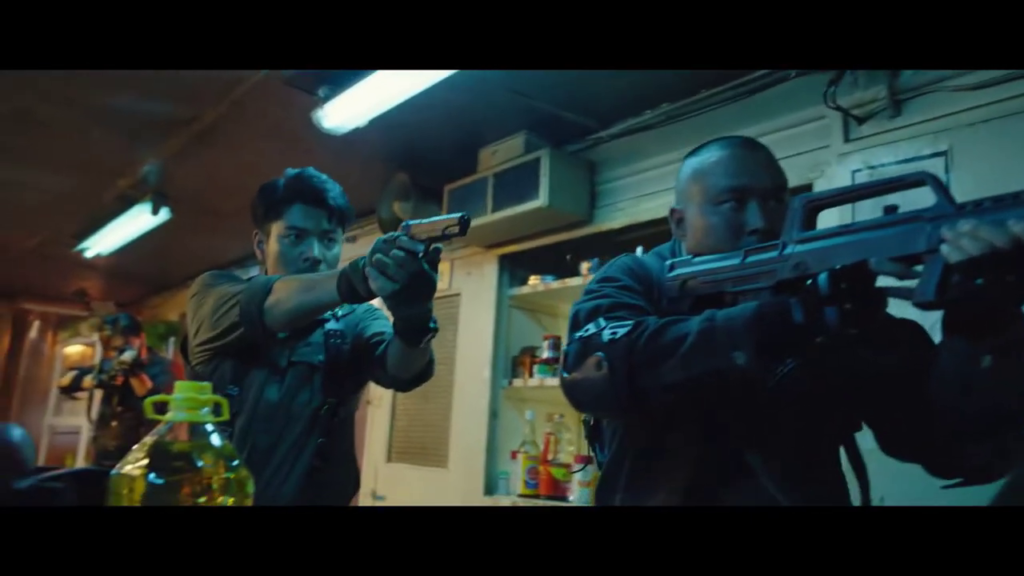
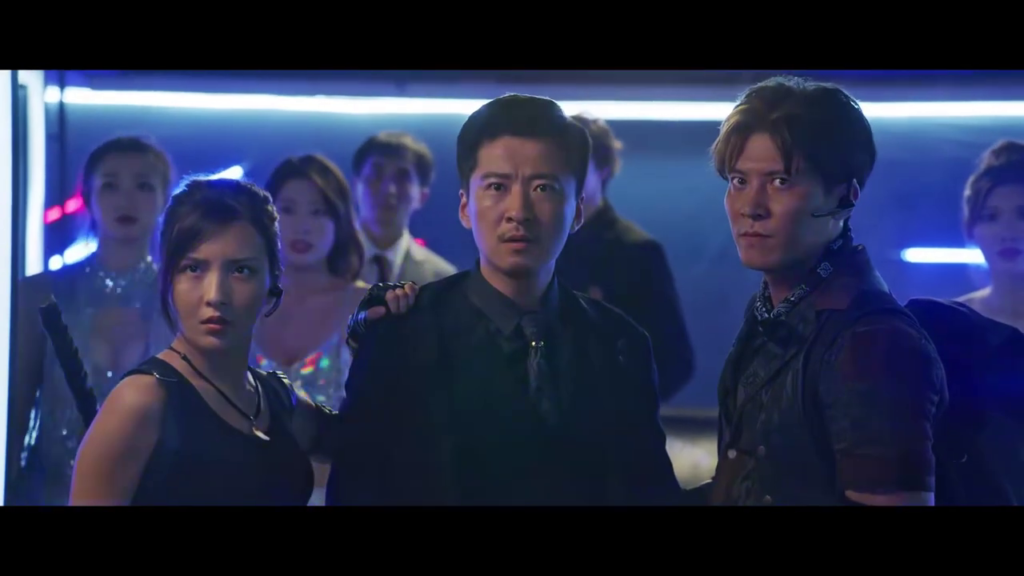
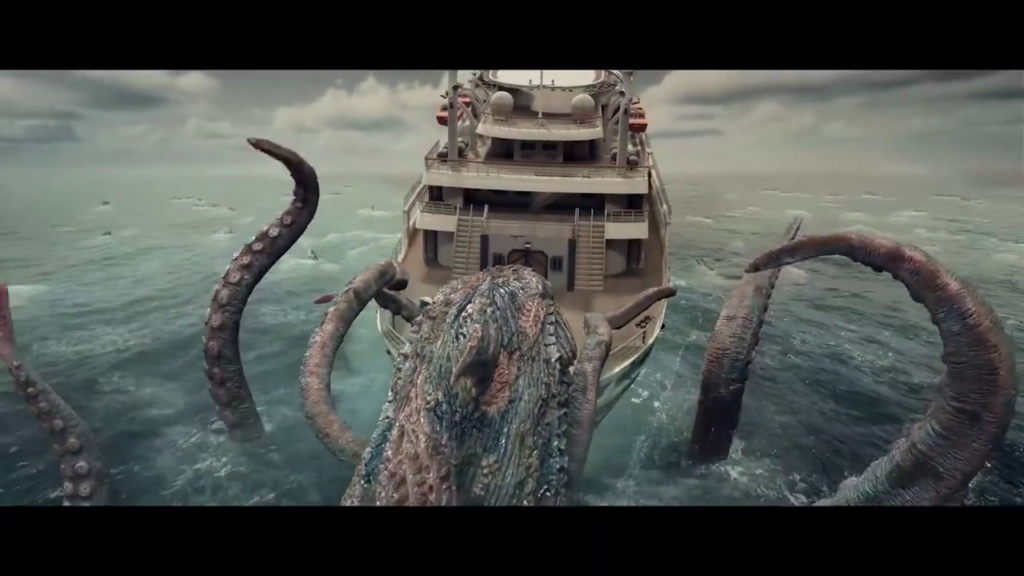


Sharktopus (2023)
Film review #607
Directors: Hu Dong-Sheng, Shixing Xu
SYNOPSIS: When a huge octopus washes up dead on the shore, Scientist Dr. Jingya Fan, who was working on the project to create it, abandons the project. The financial backer, Mr. Chen, is not impressed with this, and kidnaps her son to force her to continue her research in secret aboard his ship. When the shark-octopus (sharktopus) hybrid research subject escapes from captivity, the lives of the crew and passengers are put in danger, and must stop the sharktopus before it’s too late…
THOUGHTS/ANALYSIS: Sharktopus is a 2023 sci-fi film. technically a remake of the 2010 TV movie Sharktopus, it bears no resemblance to it other than the title, and a titular shark-octopus hybrid. At the start, a giant octopus washes up on shore (while crushing some passers by), which it turns out is a research project led by Dr. Jingya Fan and financed by the mysterious Mr. Chen. Fan leaves the project, but Mr. Chen blackmails her to return by kidnapping her son in order to get her to develop a cure for multiple sclerosis, which is what her son has as well as the new test subject: A shark-octopus hybrid, or “sharktopus” if you will. Dr. Fan is taken to a cruise ship that secretly houses a research laboratory where she can do her work, but Interpol raid the ship to arrest Mr. Chen at the same time as the Sharktopus escapes from confinement, and so everyone is searching for a way to survive and stop the monster. The film certainly has a lot more going on than the original Sharktopus film, but that’s not hard, as it barely had a story at all; just scenes of women in bikinis at the beach stitched together. This remake is essentially just a typical horror movie though, with the cast trying to avoid getting hunted down by the monster. There’s not really any gore or jump scares, so the film just focuses on the cast and their trying to survive.
The film does get quite complicated, and there’s a lot going on with the characters: you have Dr. Fan trying to save her son, then you have a team of Interpol agents raiding the ship, and one of them just so happens to be Dr. Fan’s ex-partner and the Father to her son. The whole story and all the different characters do make things quite convoluted towards the end, so we don’t get much focus on the monster as we perhaps should. Also, none of the kills are really creative or exciting either: the action is very ill-paced, and we don’t see enough of the Sharktopus to make it an interesting centrepiece for the film.
The effects in the film are a mixed bag. They are fairly detailed, including the Sharktopus itself, but the CG doesn’t blend in too well, and it looks a bit odd in motion. It definitely could have been worse, but it’s not great either. The film does offer a bit of a twist at the end, but again, since the film doesn’t really create much tension, and is all over the place, it doesn’t really feel like it has too much consequence. Overall, Sharktopus has the honour of being better than the film it is based on, but that’s a very small accomplishment given the state of the 2010 film. While the film does try and build characters and give them motivation, it’s very limited, and it doesn’t offer anything exciting in terms of being a monster film, with lacklustre horror, action and/or gore. I suppose the 2010 film at least had a self-awareness that it was silly, but this 2023 version really takes itself seriously, without the stronger plot and production to back that up.
-
#606 – Summer Wars










Summer Wars (2009)
Film review #606
Director: Mamoru Hosoda
SYNOPSIS: Kenji is persuaded by classmate Natsuki to visit her family with her; posing as her boyfriend for the approval of her grandmother, who is celebrating her ninetieth birthday. As if that wasn’t enough trouble for Kenji, he inadvertently sets off a virus in the OZ network, a digital network that governs most of daily life, causing a rampant AI to seize control of people’s accounts, and control of many systems in the world, causing him to be a suspected criminal…
THOUGHTS/ANALYSIS: Summer Wars is a 2009 anime film. Kenji, a high school student and part-time moderator for the OZ, a digital network that spans the entire globe and almost all aspects of daily life. He is persuaded by fellow student Natsuki to visit her Grandmother, and pose as Natuski’s boyfriend at a family gathering for her Grandmother’s ninetieth birthday. As all of these shenanigans are unfolding, a rogue AI has infiltrated OZ, and is slowly taking control of systems all over the world, with Kenji being a suspect in the attack as he inadvertently solved a decryption key without knowing what it was for. The film is a combination of this slice-of-life melodrama, with the more dramatic and wide-reaching effect that this rogue AI is having. The film places them both on equal footings, and balances them fairly well; interweaving the two into a considered tapestry that ties the fate of the characters to what’s happening in the film as a whole. The threats are threatening thanks to some neat designs, and the family has a messy feel to it, but feels full of life, again just like how you would expect a large family to interact when they’re all placed together.
While the film has a positive reception from a lot of people, there are definitely some blind spots which hamper enjoyment of the film for me. Firstly, the main characters, Kenji and Natsuki, are very bland, and don’t bring much unique much to the film in terms of their own personalities and quirks, and as such, they are a bit cliché. They also don’t have that much time on screen together, so it’s a bit awkward when the film tries to push them together for more emotional scenes. Another issue I had is that the characters don’t really contribute that much to the action scenes in OZ: the Ai just does it’s own thing most of the time without much interference and a few fight scenes, and I felt like this connection between the two realms could have been developed in a stronger manner. The film is, as you might expect, heavily embedded in Japanese customs and traditions, but I don’t think you need too much knowledge of them to enjoy the film, but knowing what the card game Koi-Koi is, for example, would certainly be beneficial for understanding what’s actually happening in the film’s climax, but you can get the gist of what’s happening without it.
The animation and visuals are pretty good, with the world of OZ being colourful and fluid. The “real world” contrasts this with a more simple and faded colour palette and style which works well to contrast, but perhaps that extra bit of detail would have been nice to get across the character’s feelings and actions, which as mentioned is one of the film’s weaker points. The film bears a lot of similarities to one of director Mamoru Hosoda’s previous films based in the Digimon franchise: Digimon Adventure: Our War Game very similarly had the main characters have to defeat a rogue digimon that was taking over systems through the internet, and Summer Wars does feel very similar to that. The studio which made this film also made The Girl Who Leapt Through Time previously, which was a huge hit, and similarly combined a slice-of-life drama with more fantastical elements. However, Summer Wars doesn’t have the emotional weight that TGWLTT placed on it’s characters, and fails to reproduce that magic: maybe a rogue AI on the internet (or OZ) just doesn’t seem that fantastical of a concept compared to time travel, and so the different elements of Summer Wars just don’t produce a more exciting reaction when they’re mixed. Summer Wars is not a bad film: it’s well crafted and considered, and balances it’s different elements well, but the blind spots I have mentioned with regards to the characters and such are a bit too prevalent for me, and overshadow a lot of the film’s positive points to dampen them just enough to leave a lasting impression of something flawed amidst the good that the film does.
-
#605 – Redline (2009)
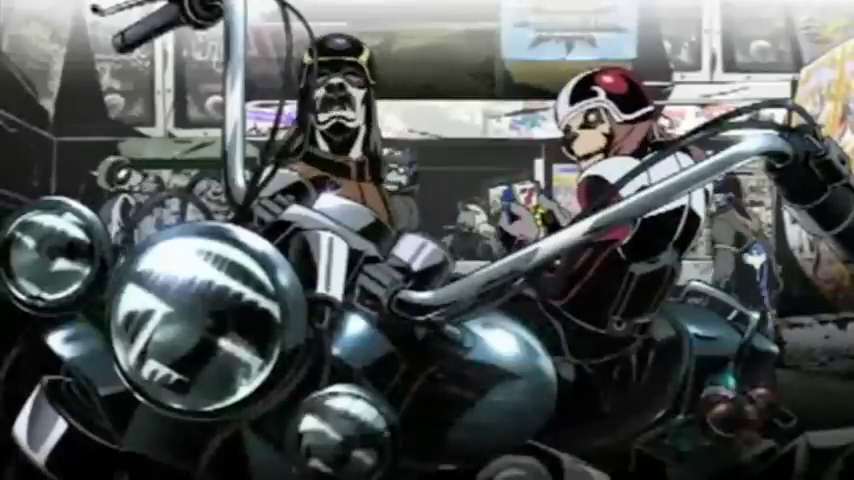
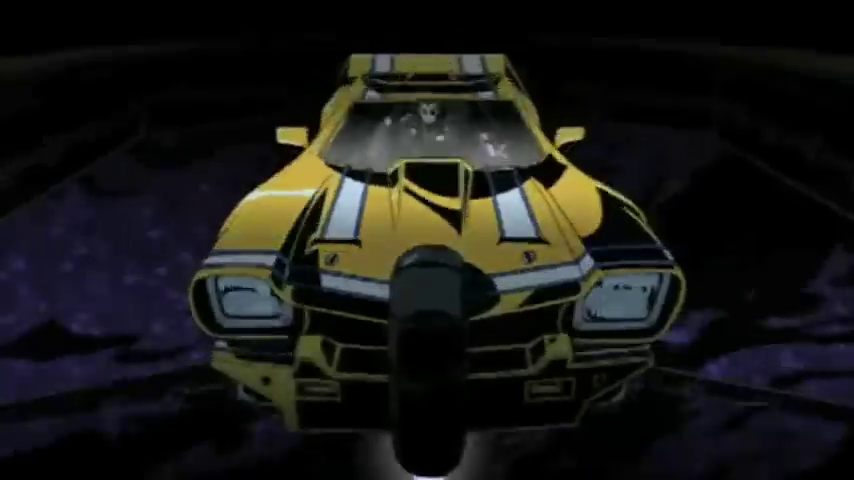
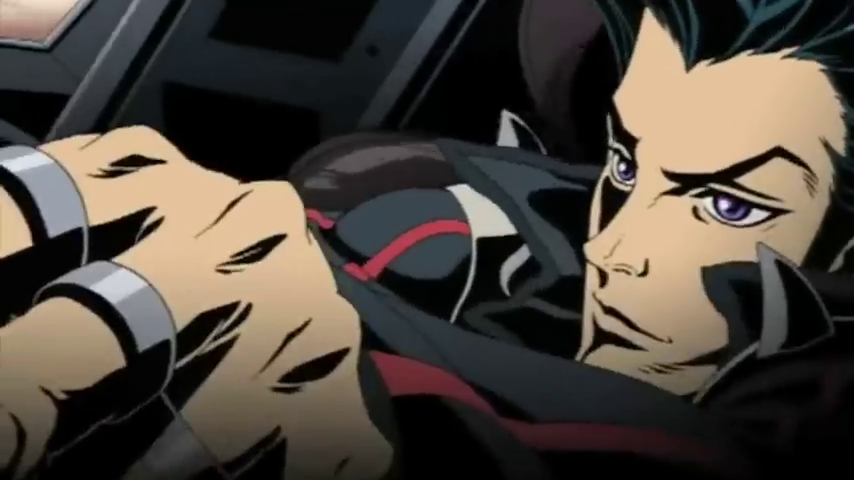
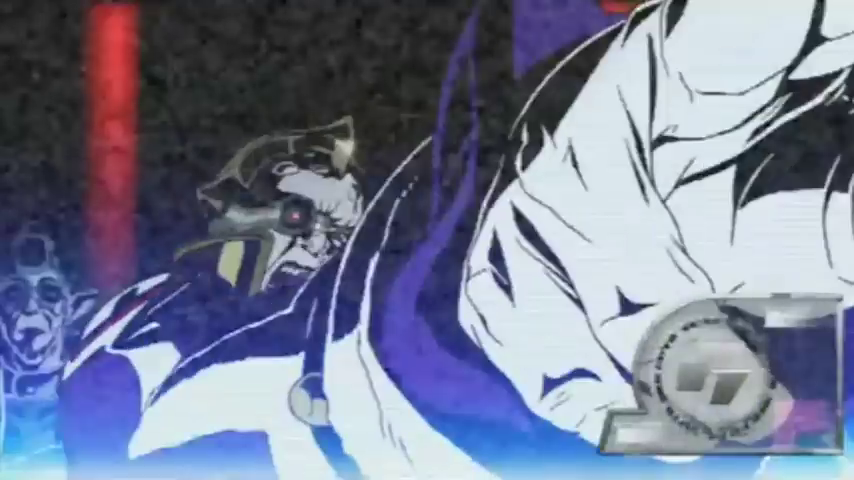
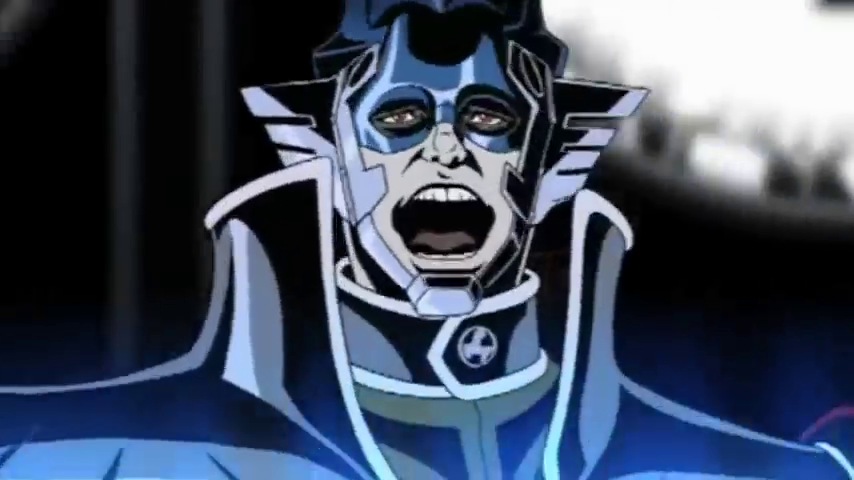
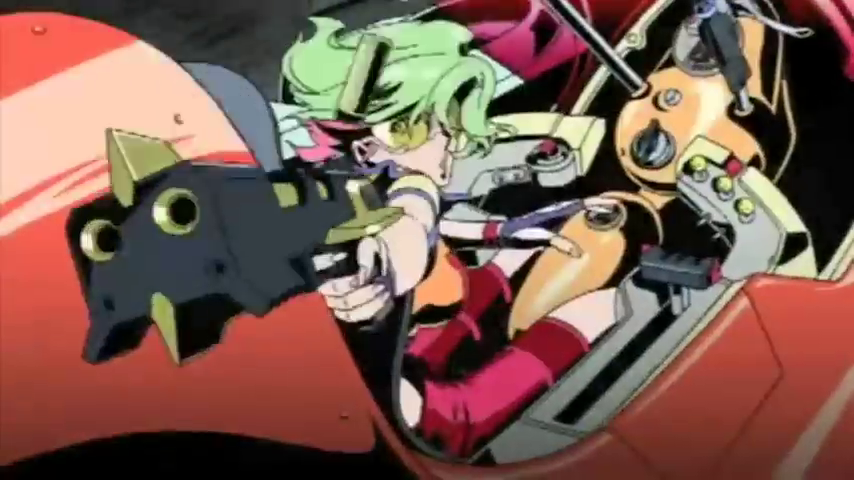
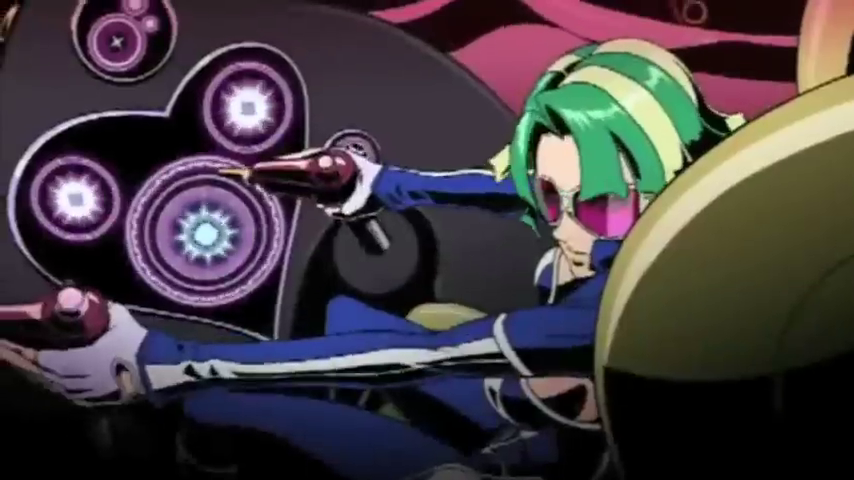
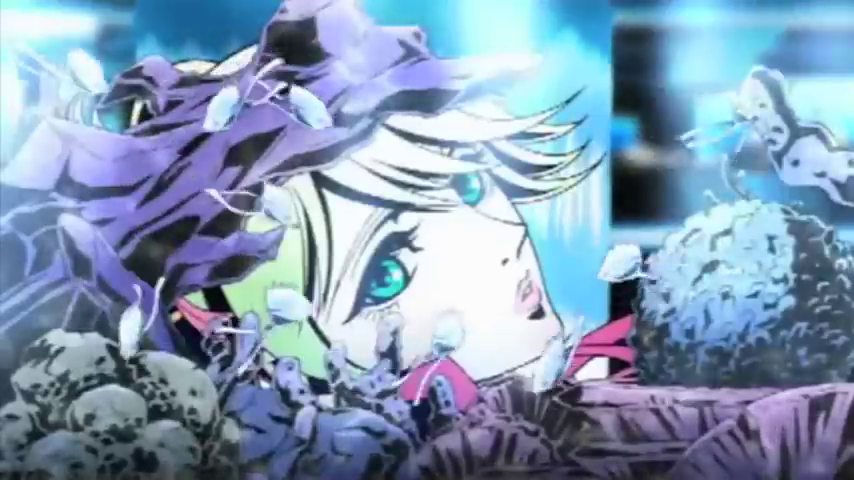
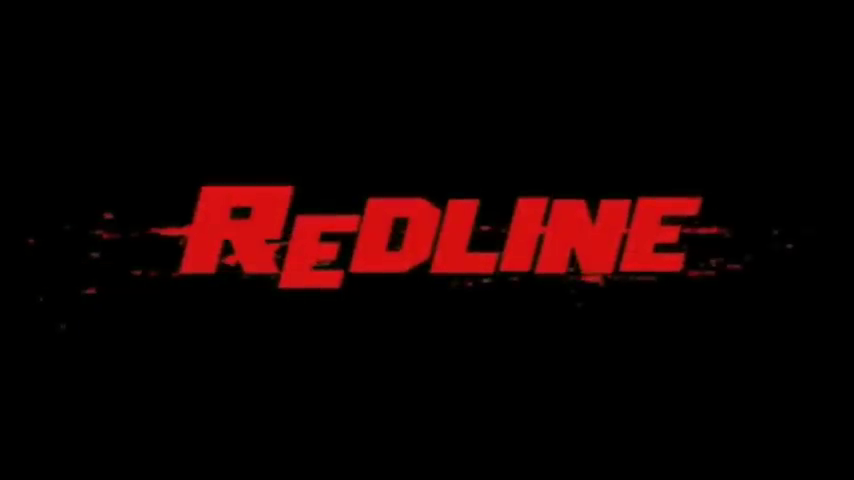
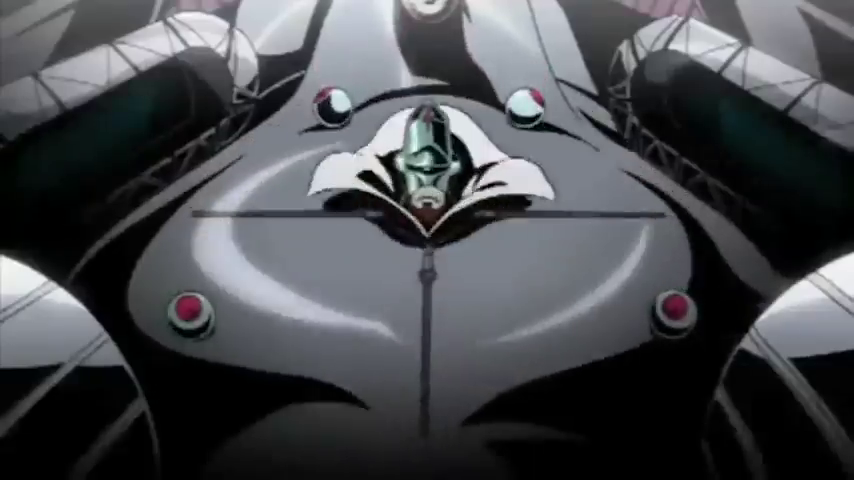
Redline (2009)
Film review #605
Director: Takeshi Koike
SYNOPSIS: In the future, the most thrilling race in the galaxy is held every five years. racer JP manages to qualify for the race after other competitors drop out, and must risk his life in the ultimate race…
THOUGHTS/ANALYSIS: Redline is a 2009 animated sci-fi film. The film is set in the future, where the ultimate race in the galaxy has competitors fight to the finish line by any means necessary; risking their lives to achieve fame and riches. One of these racers is JP, who manages to qualify for the redline race, even though he crashed out of the previous race, since other racers withdrew because of the race taking place on Roboworld, where the the rulers will attempt to stop the race by any means necessary. The film starts off with the preliminary race and we immediately get the full force of the movie: high speed and explosion that never misses a beat. This is where the film’s strengths really shine, as the animation is smooth, colourful, and detailed. The film is composed of over one hundred thousand hand-drawn frames, and is quite an feat to pull off, however it certainly seems worth the effort.
The weakness in the story comes in the middle part of the film, where there is no racing, and the film relies on character interaction and development. This isn’t completely void of interest, but it does feel like the film is padding itself out a little before the big race, and there’s no real impactful relationships between the characters. There’s some hint of a past between JP and Sonoshi, another racer in the redline race, but it’s never really resolved or impacts the story, which is odd. The romance element again doesn’t feel earned between them. When the racing picks up again though, you’re treated to an intense display of speed, action and well choreographed set pieces that will make you quickly forget all of that. The influence of futuristic video games such as Wipeout and F-Zero are also easy to spot, as the high speed, high stakes racing combined with the colourful and varied character designs such as you might see in F-Zero, add some real variety and visual appeal to the film, even if you’re not really given much backstory to their characters or the universe in general.
Overall, Redline is at its best when is being a general assault on your senses: when it’s fast, loud and violent, it’s captivating and a thrill to watch. The set pieces, pacing, and scale again give the film an epic feel. The film does slow down a bit during the middle, and fails to really cement much character development or raise the stakes personally for them. None of that really matters much though, as the film shines where it needs to when the race is on and the action is high.
-
#604 – Sharktopus (2010)










Sharktopus (2010)
Film review #604
Director: Declan O’Brien
SYNOPSIS: A top secret experiment that created a shark-octopus hybrid has lost control of the subject, as it goes on a rampage across the coast hunting down beachgoers. It’s creators try to get it back under control as the ‘sharktopus’ continues its hunt.
THOUGHTS/ANALYSIS: Sharktopus is a 2010 shark TV movie. A top secret government project has developed a shark-octopus hybrid, codenamed S-11, and for some reason it is allowed to wander the ocean because the team can control it thanks to a control unit attached to it. When the control unit unsurprisingly breaks, the team must regain control of the creature and hunt it down as its rampage continues. Even with the ridiculous twist of a shark-clone hybrid, the film is nothing more than a typical shark film. In fact, that doesn’t seem to be it’s main focus either: the film is more interested in showing off women in bikinis, as this seems to be the focus of every shot, rather than anything else that is happening. You expect a bit of that in these films, but it is near constant here. The main plot barely has anything to it: the hunting of the sharktopus is interspersed with another plot thread about reporters, and another radio DJ, but these are pointless distractions that serve only to pad out the runtime as the main story is so lacking. Add to this the sheer predictability of all the setups and kills, and you’ve got a whole lot of nothing to hook you.
The characters are all a pretty unlikable bunch: Eric Roberts is the only noteworthy actor attached to this, and he’s playing the character he always is. The rest of the characters are as mentioned abrasive and unlikable or bland tropes not worth remembering. The sharktopus itself is a CG monster that looks pretty terrible, and doesn’t look real in any way. A lot of the scenes are also clearly not on location, as the green screening reveals itself quite easily. I suppose on a positive note the kill count for the sharktopus is pretty high, and fairly constant, but really there’s not a whole lot to write home about in Sharktopus: it doesn’t utilise its novel concept, it lacks any kind of depth in terms of story or characters, and it’s sole interest seems to be to just film women in bikinis without any attempt to hide it. Another one in the pile of low budget shark films.
-
#603 – Super Apartment Wife (2021)
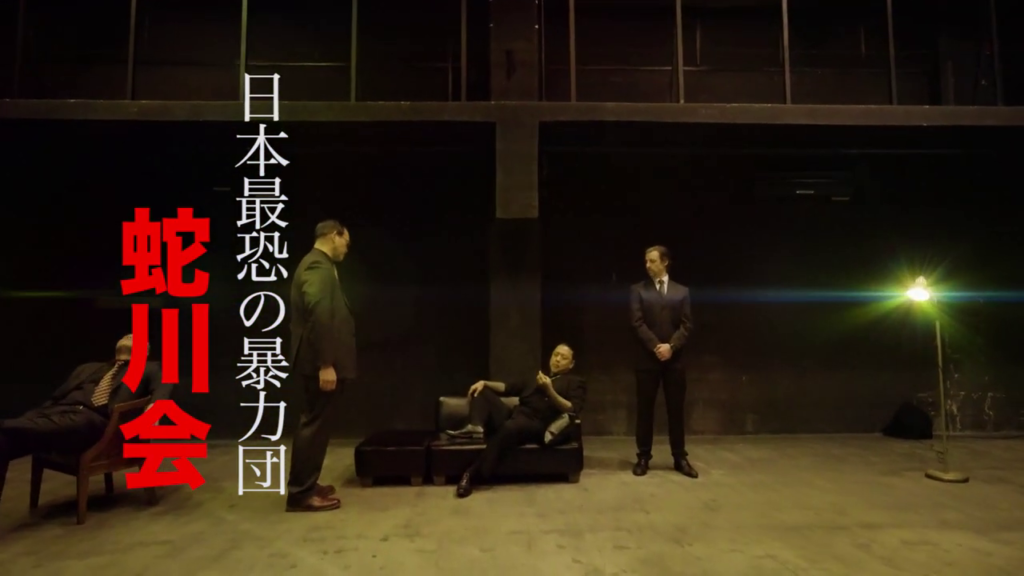
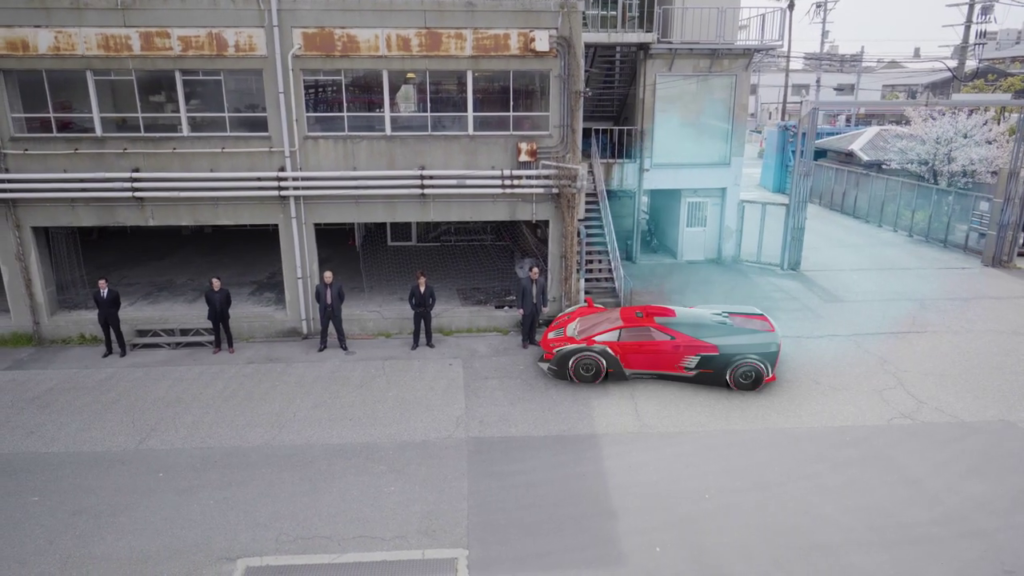
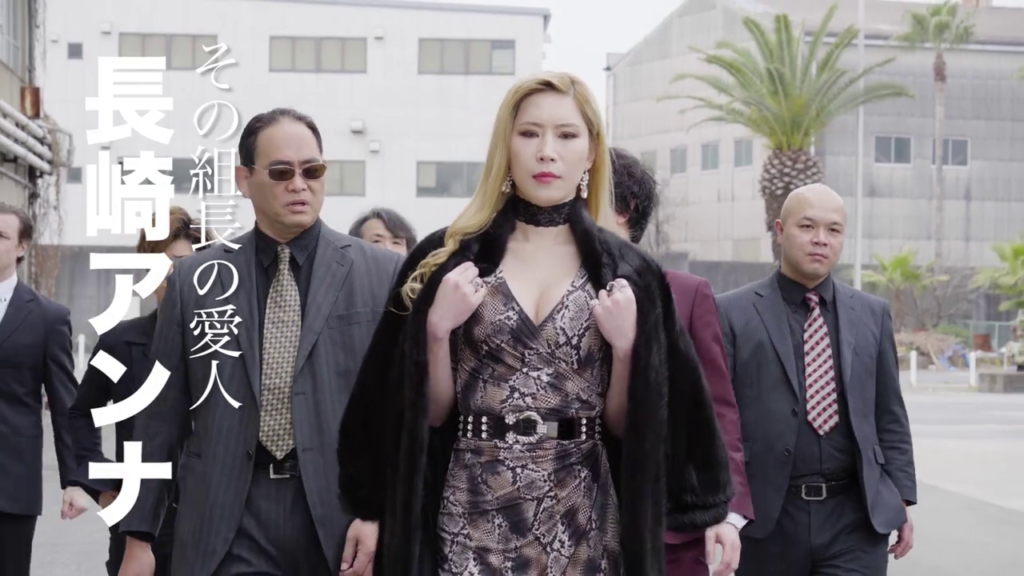
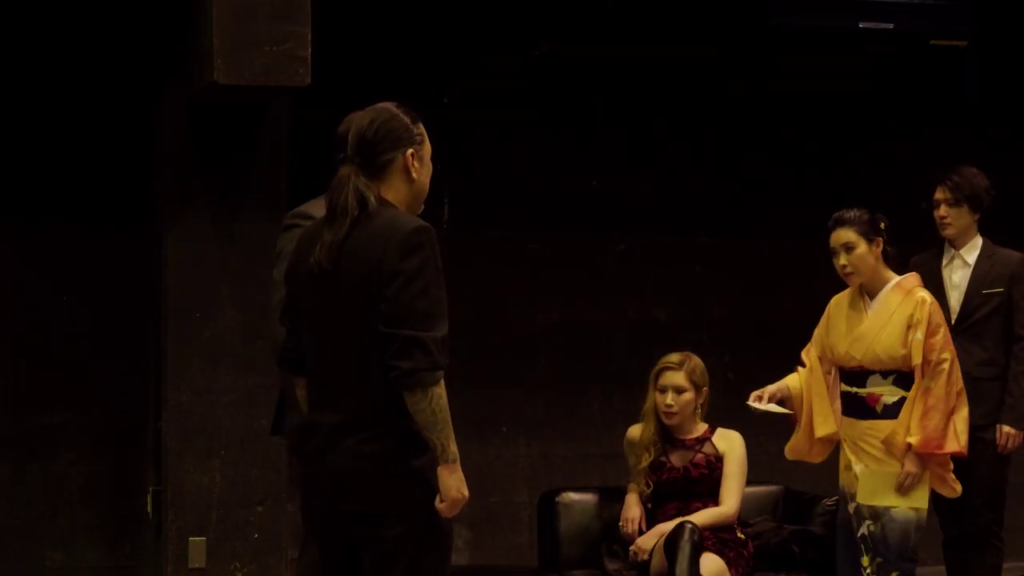
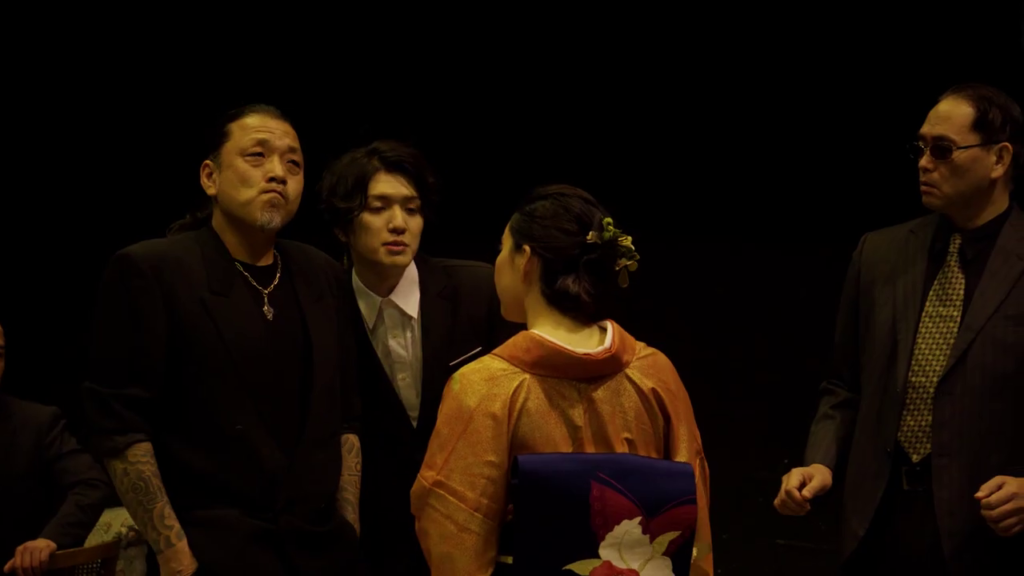
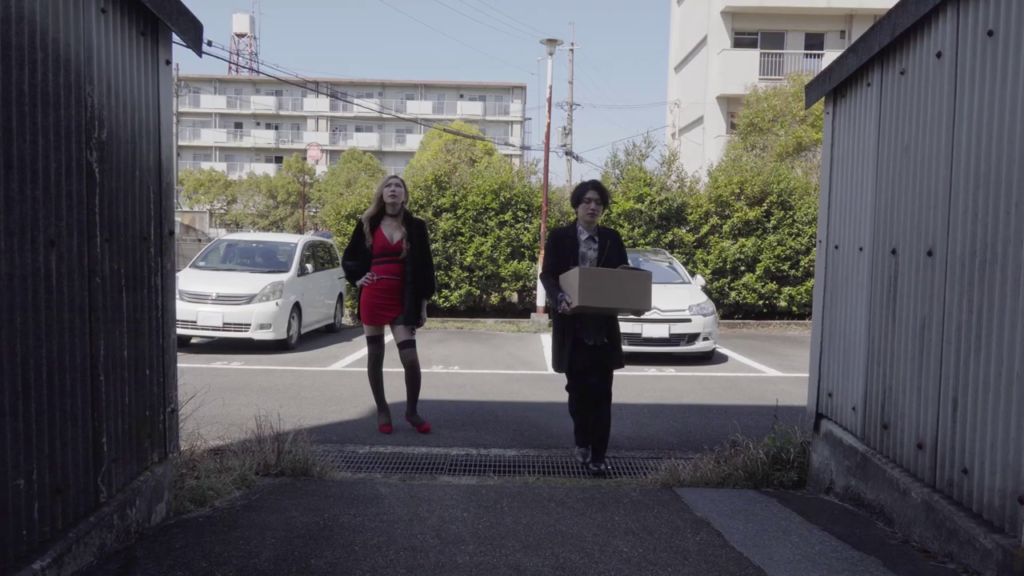
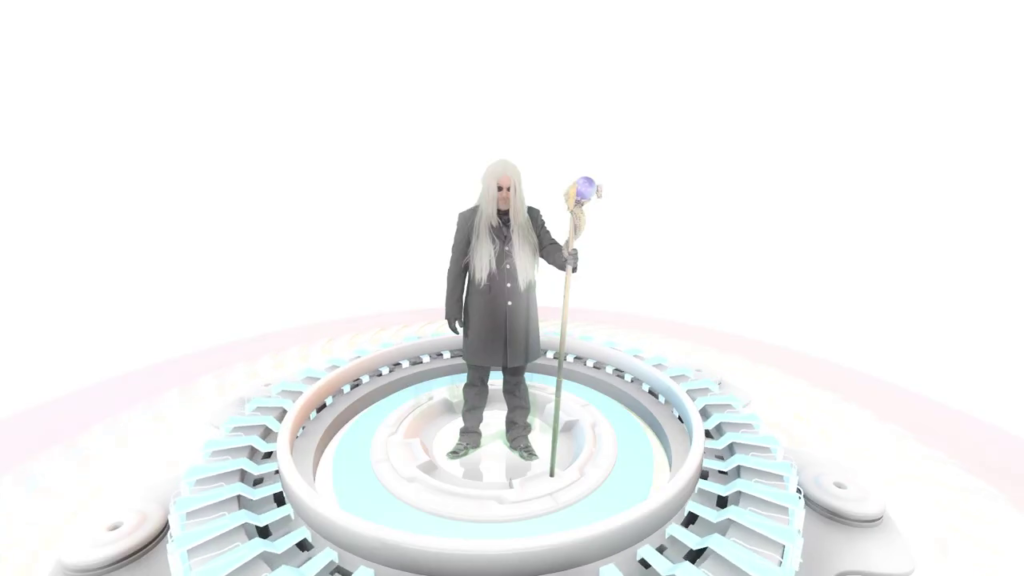
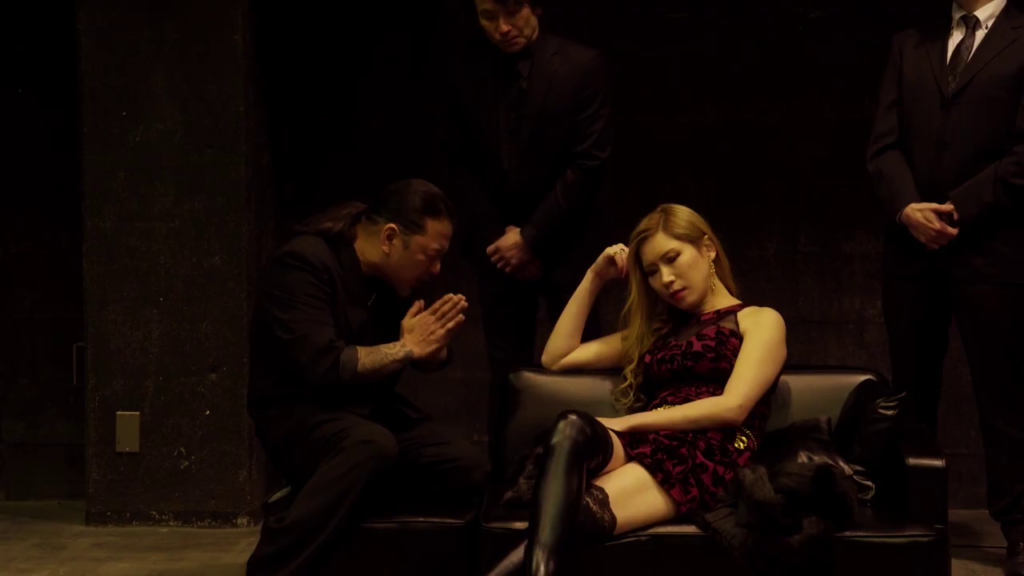
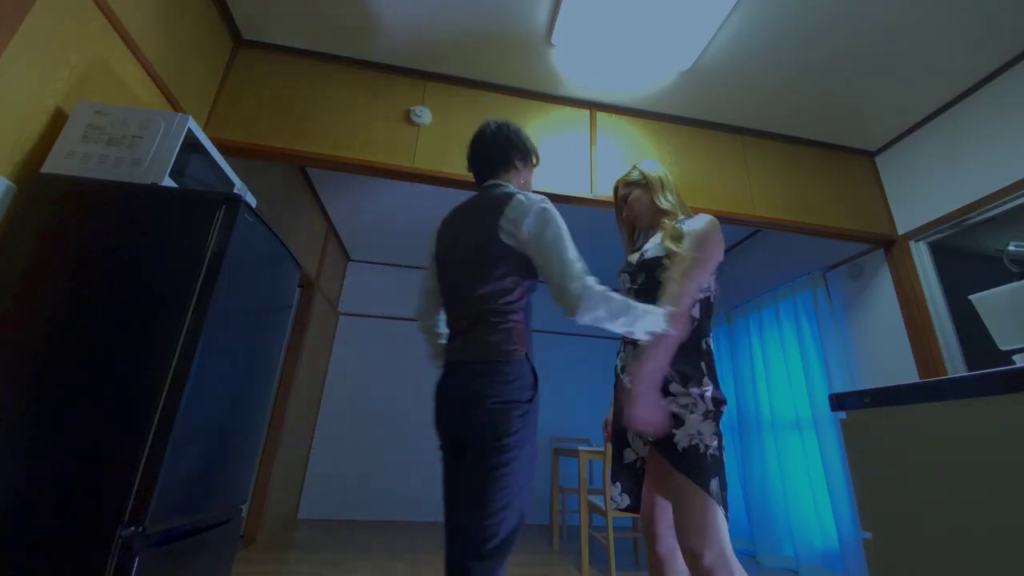
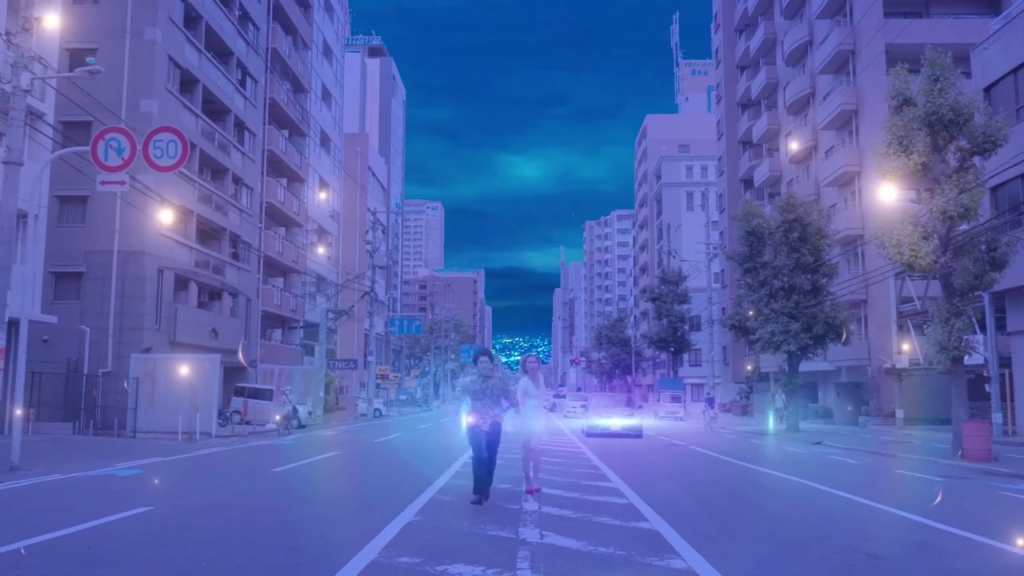
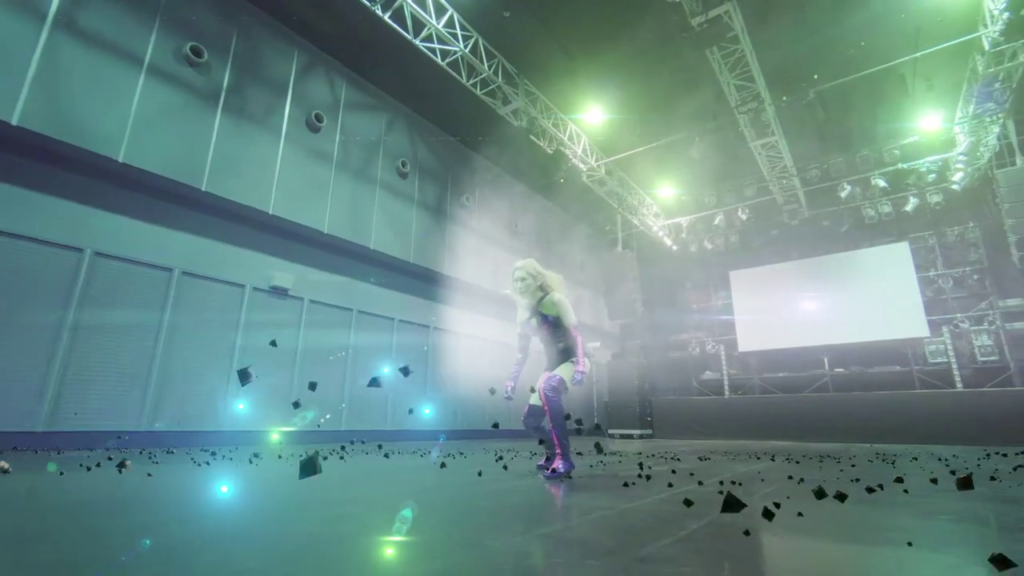
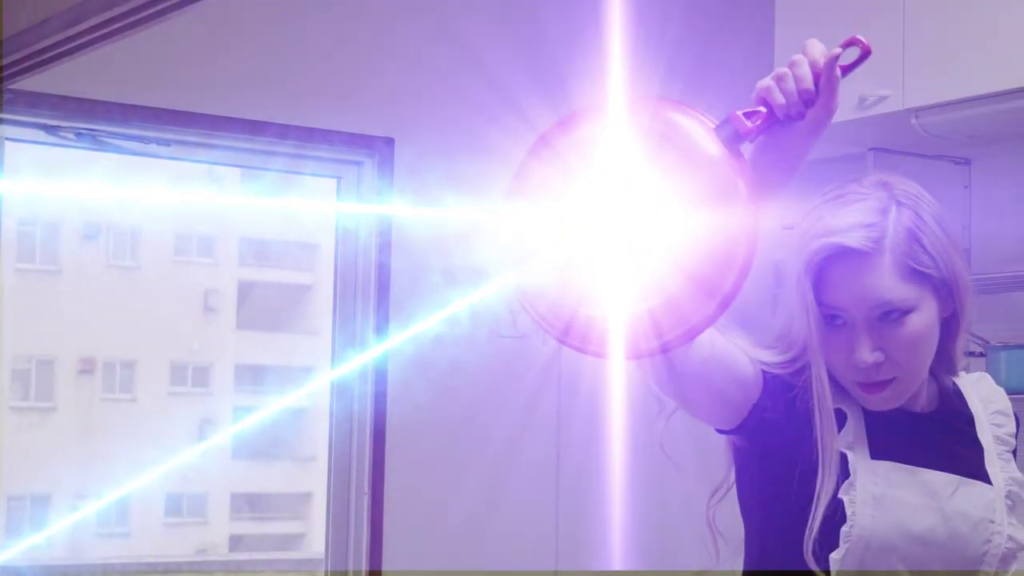
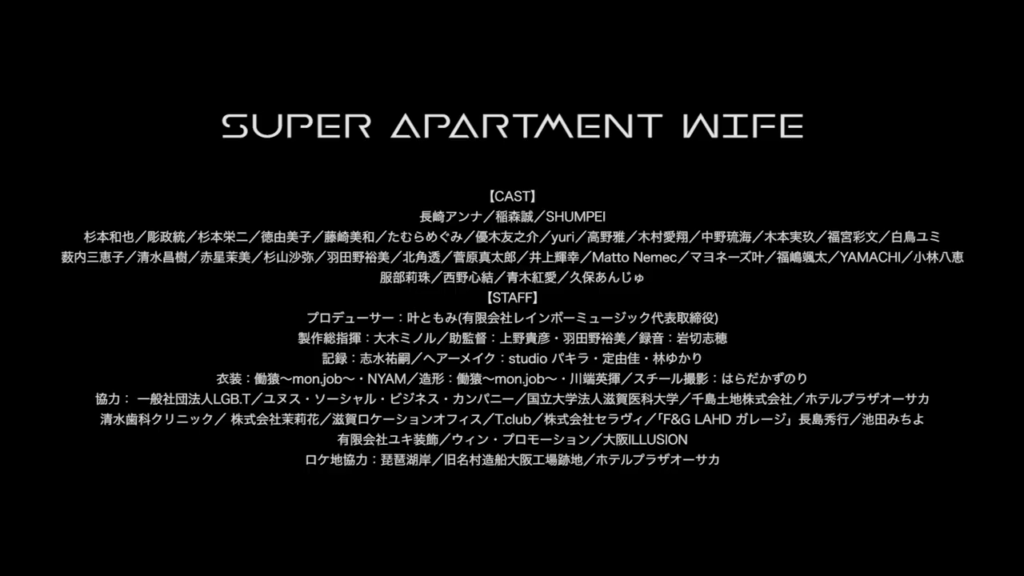
Super Apartment Wife (2021)
Film review #603
Director: Anna Nagasaki
SYNOPSIS: A yakuza boss needs to divert attention away from his mistress, Anna, as his wife is becoming increasingly suspicious of him. She is ordered to move in with newcomer Sho Nagasaki, and pretend to be his partner. However, the relationship becomes complicated when the yakuza boss has to engineer their “break up,” as well as the small matter of Anna being the daughter of an evil God who wants to wipe out humanity…
THOUGHTS/ANALYSIS: Super Apartment Wife is a 2021 sci-fi film. Starring, written, and directed by Anna Nagasaki, the plot concerns a yakuza boss who needs to hide his mistress from his suspicious wife. They plan for a newbie, Sho Nagasaki, to pretend to be her partner, and have her move in with him to try and fool the private detective the boss’s wife has hired. A simple enough plot, which I’m sure has the potential for some comedy or typical romance stuff, but there’s no real sense of what the film should be: I think it’s mostly meant to be taken seriously, but the stunted and sparse dialogue from the main characters makes it difficult to get to grips with what they are thinking. The whole film seems to have very little idea what it is doing, with Nagasaki never having written, directed, or starred in a film (her background is as an influencer). I think there’s a germ of an idea in here somewhere, but it fails to blossom in any way.
If you think the plot is already quite odd, then we haven’t even addressed the really weird stuff yet: it turns out that Anna is the daughter of “Darkness of Love” (it’s hard to translate the Japanese name), who is basically evil God, who wants to destroy humanity and replace them with more interesting species or something. Stranger still, it is implied this God (who looks like he belongs in The Matrix) is the Christian God, as he talks about creating Adam and Eve and whatnot. He visits Anna and reveals who he is, and tries to tempt her to embrace her evil powers and destroy humanity. We get there’s something special about her earlier because of these odd flashbacks of her Mother telling her not to get emotionally involved and accidentally unleash her demon powers or whatever, and there’s also this odd scene at a dentist as a flashback, which I can’t remotely fathom why it is in there or what it is meant to signify. So anyway, Anna eventually is consumed by her evil powers as she thinks Sho is seeing another woman, who is actually part of the yakuza boss’s plan to break up the couple so his wife doesn’t get suspicious, and this other woman is actually one of God’s other children, and maybe the yakuza boss’s wife is too? Honestly, I got completely lost at this point, as the film turns into this battle for the Earth at it’s climax, and everyone duking it out with God-like powers, and the yakuza trying to shoot them. The whole experience is just so surreal and chaotic I’m still at a lost of how to process it. Fortunately (?) the film does have a happy ending, as Anna and Sho have a kid and live happily ever after or something, but again, this just doesn’t really follow on from the madness that ensues at the climax; it’s just a bunch of half-cooked ideas thrown together with barely any structure to make them stick.
What makes this film feel truly amateur is the production and effects: a lot of the film looks like it was set on a stage at a local theatre, or an industrial estate just around the corner. The CGI is all very basic 3D models, and the greenscreen effects are clearly not done right, as they bleed into the actors constantly, The whole film (if this even counts as a film) is a half-baked mess of ideas, with zero chemistry between the characters to create any sense of romance or drama, and a bizarre angle concerning an evil God wanting to wipe out humanity that adds a completely different level of incomprehensibility. It clearly has no budget and a severe lack of expertise, so you can’t be too hard on the end product based on what it was working with, but there are some things which would have been easily improved. I can see what it’s trying to do, but every step it takes towards it is misplaced and ends up somewhere completely different. Probably worth a watch only if you really want to indulge in something completely insane and devoid of sense.
